Saturday, December 02, 2006
Eight years of Chavez, eight years of accomplishments
When Venezuelans go to the polls in a few hours they will be making what for most of them will be an easy choice. In all likelihood most of them will want to continue down the path Chavez has started them on.
The reason for that really doesn’t have much to do with what Chavez has said or promised to do, nor even with whatever emotions he has inspired. Rather, most Venezuelans appreciate what Chavez has accomplished over the past eight years. Lets look at what some of those accomplishments have been.
In 1999 Chavez inherited a country very much headed in the wrong direction. The previous decades had seen poverty increasing, the economy stagnating, a hyper-corrupt business/political class looting the country and violent repression of dissent.
Yet as bad as things were there is no indication they had even hit bottom. The economy was literally shrinking before Chavez took office which was largely the result of self-defeating oil policies that wasted billions of dollars on money losing investments while sending the price of oil through the floor.
As soon as Chavez came to office he fired those responsible for the disasterous policies, revitalized OPEC, started raising taxes and royalties on oil companies, and ever since Venezuela has been reaping the benefit of steadily rising oil prices:
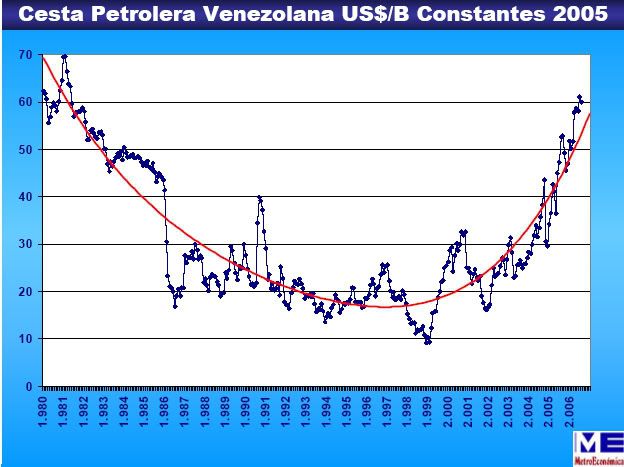
Rising oil prices have brought windfall revenues which returned the state oil company, PDVSA, to levels of profitability not seen in decades. This in turn has fueled dramatic economic growth over Chavez’s turn. The economy has stumbled when the opposition has led coups and oil strikes but when the country has been calm, as it has been over the past three years, it has prospered under Chavez.

Most all of Venezuela’s economic indicators have turned highly positive.
Inflation, which was up to 100% a year under the previous government, has been tamed:

Public debt in relation to GDP is declining and is less than when he came to office:
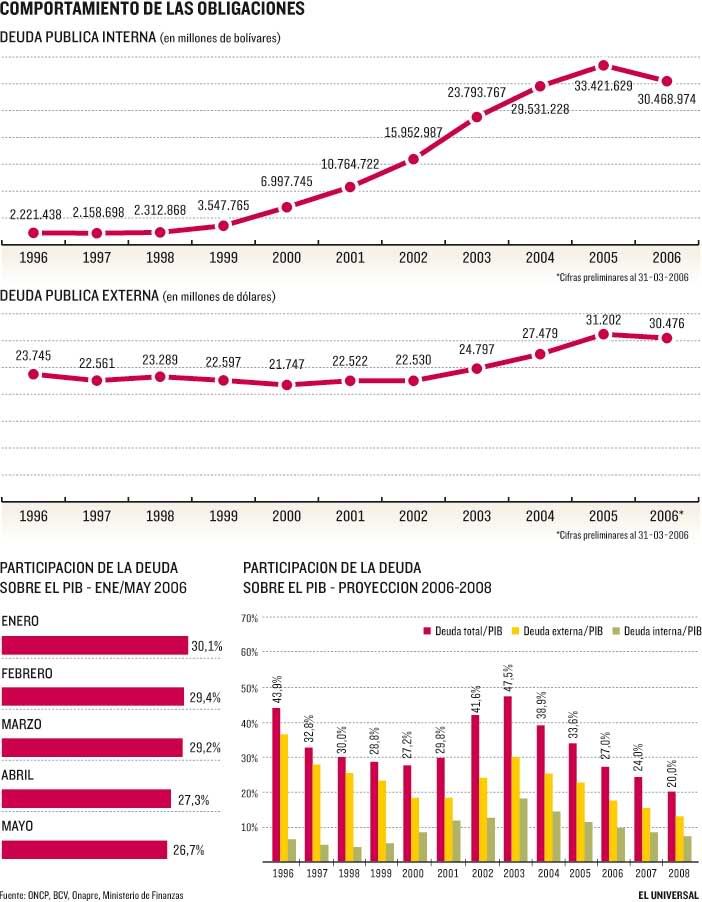
Foreign reserves of hard currency are at an all time high and more than double the level of when he came to office:

Hundreds of thousands of new jobs have been created (mainly in the private sector) with almost 400,000 being added in the past year alone as this graphic shows:
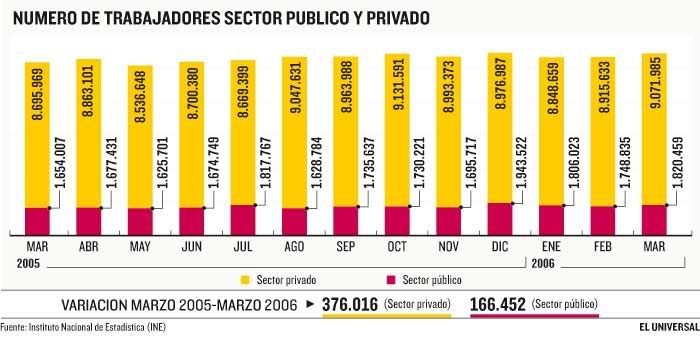
Consumption of Venezuelan consumers has reached levels not seen since the early 1980s (it is actually off this chart!):

This does has its down side though, as record auto sales have left Venezuelan streets jammed with new cars
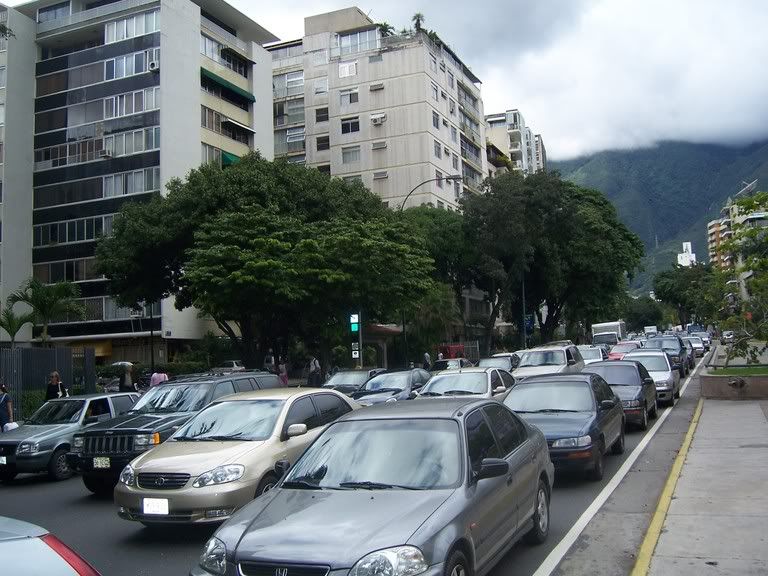
What have all these good economic numbers done your average Venezuelan? Simple, they have boosted their standard of living significantly. The lowest social classes have seen their real income rise dramatically:
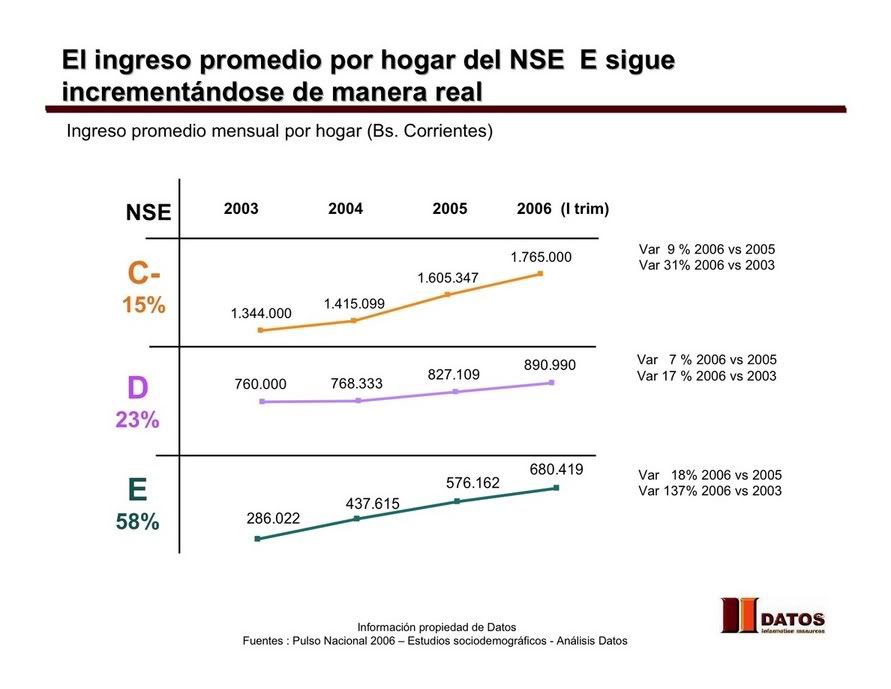
For more details see here and here.
Poverty, in spite of going up after the opposition led oil strike has gone down dramatically recently with 37% of Venezuelans now being poor compared to 47% before Chavez came to office:
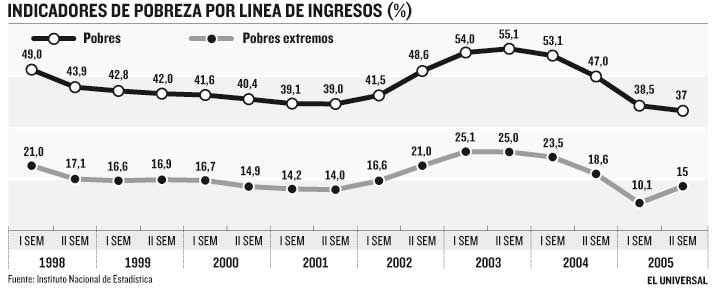
Of course, Chavez hasn’t been content just to let oil revenues go up, he has also taken the novel approach of actually collecting taxes from Venezuelan business people.
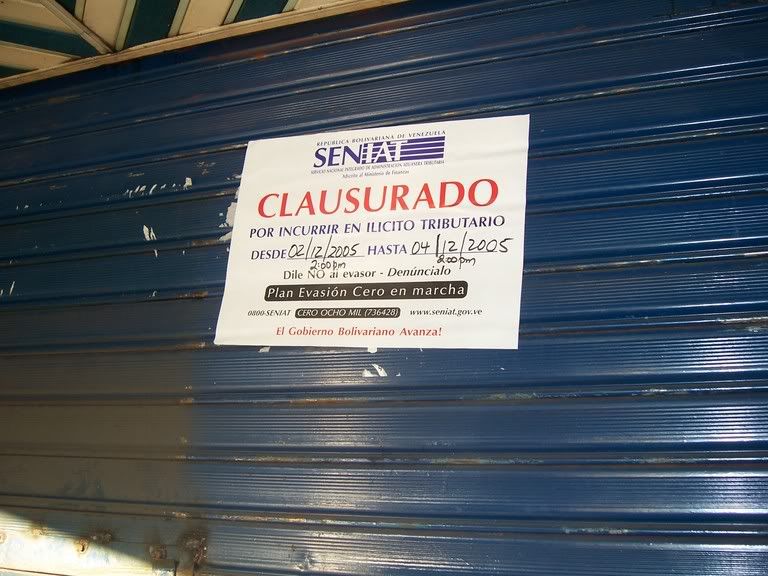
All of this means that not only do average Venezuelans have a lot more money in their pockets but so does the government. And what has the government done with all that money. See for yourself.
It has set about building dignified housing for people. Previous public housing was junk that often wound up like these never used buildings in Barquisimeto:
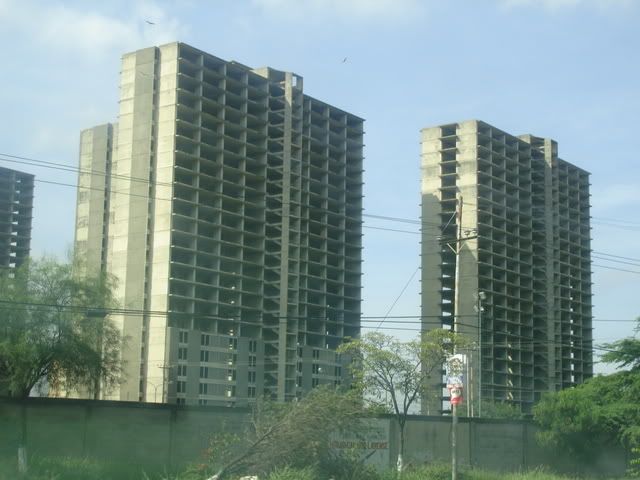
By way of contrast the housing build now is attractive and durable:
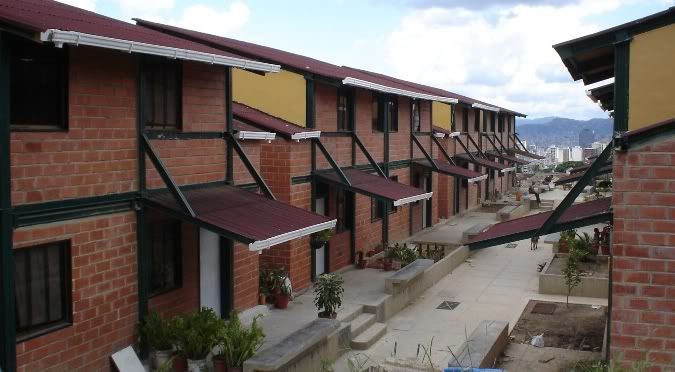
And it is even nicer on the inside than it is on the outside
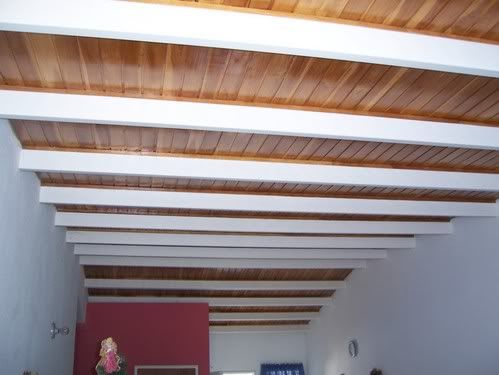
Which housing would you prefer to live in?
He has set up thousands of low cost stores throughout Venezuela and had them well stocked with staples of everyday life and needed medications. Almost half the Venezuelan population benefits from these reduced price stores:
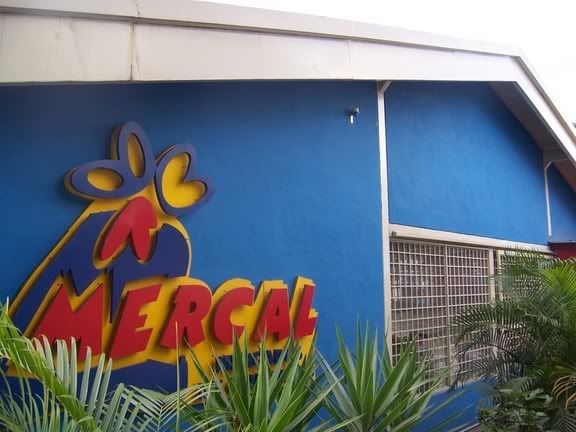
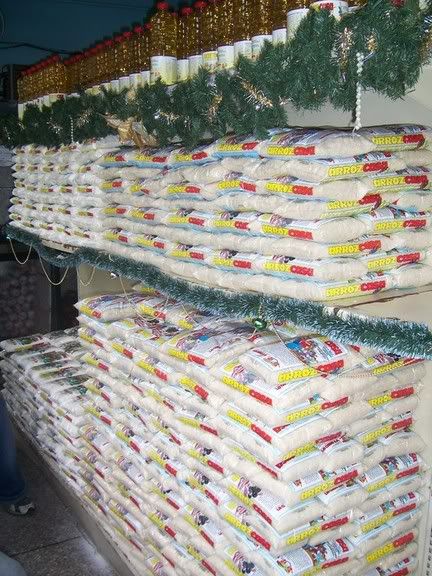
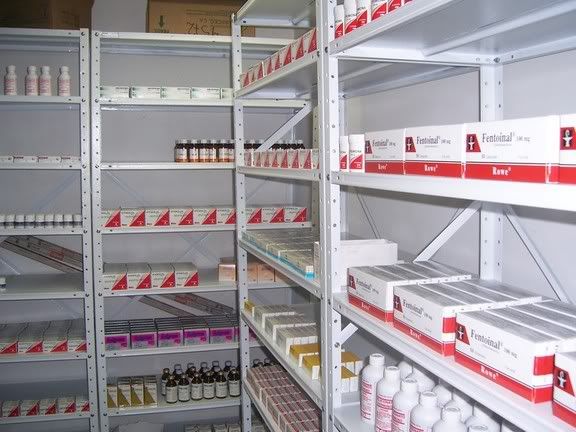
He has built literally hundreds of new medical facilities chock full of state of the art equipment and given millions of Venezuelans access to modern health care for the first time in their lives.
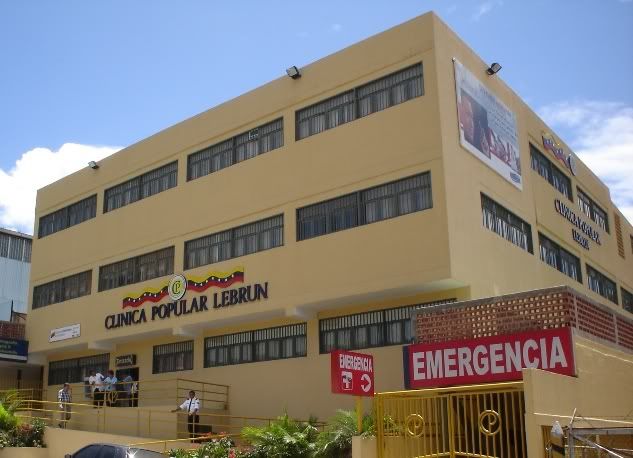
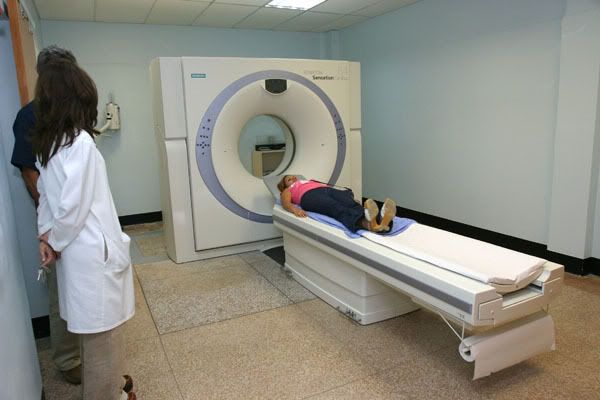
He has built scores of new universities and schools while renovating others:
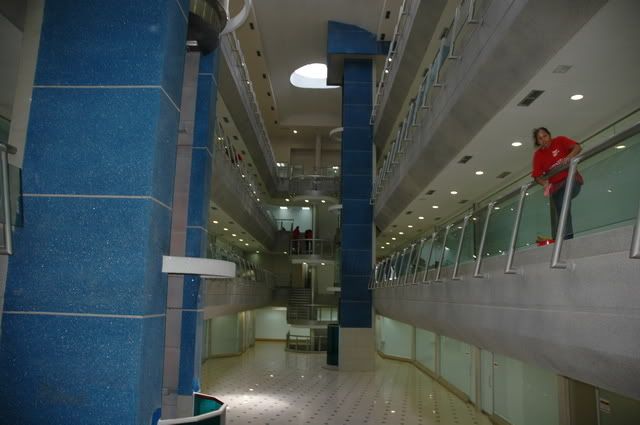
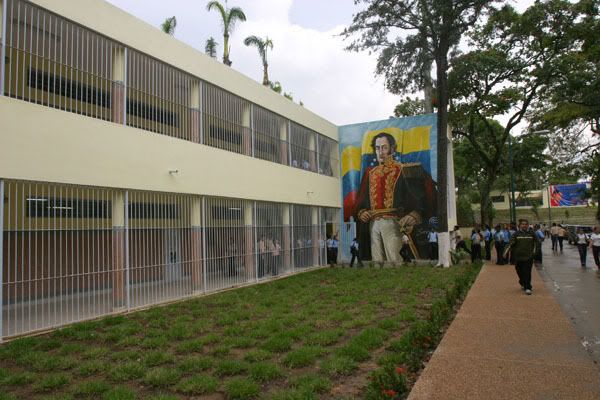
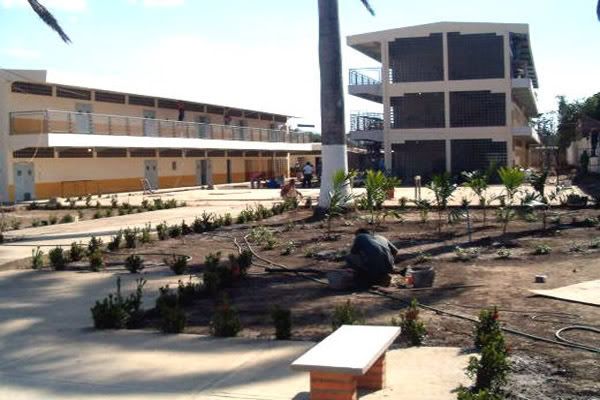
He has built massive hydroelectric plants that will reduce dramatically the amount of oil Venezuela has to consume internally:
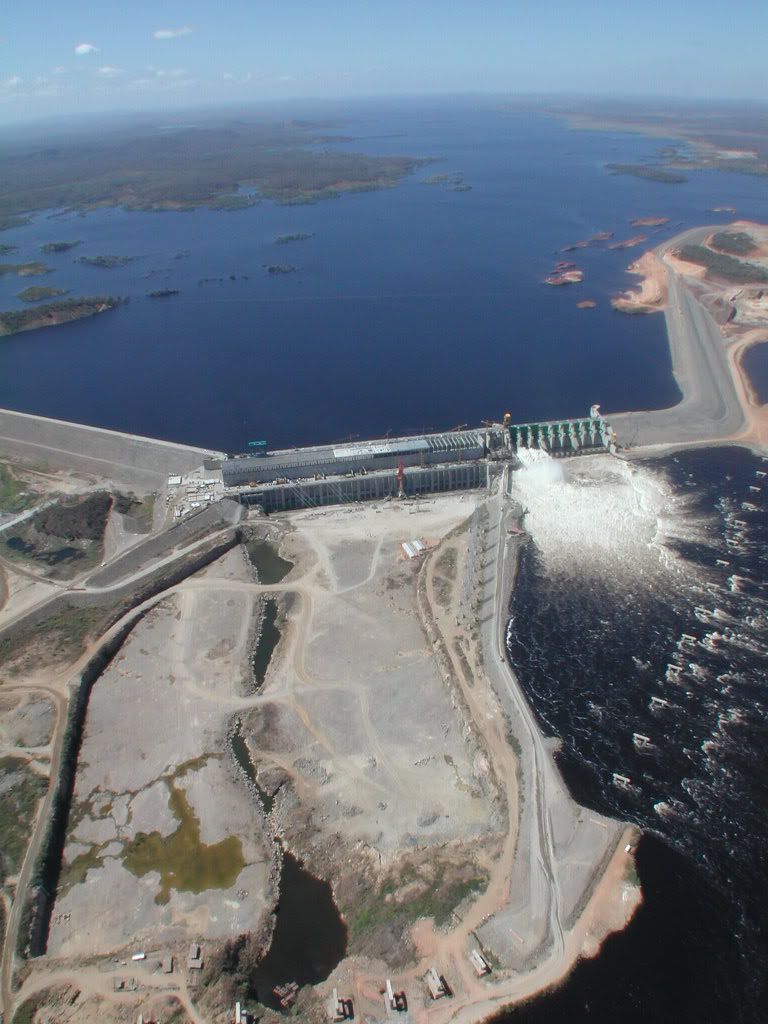
And no sooner does he finish one than he begins another:
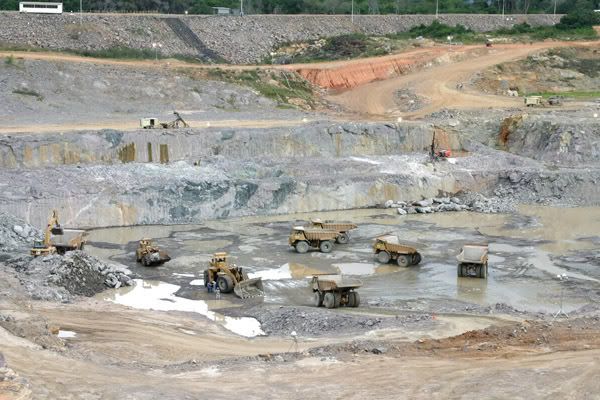
He tunneled through mountains and bridged ravines to begin the process of linking Venezuelan cities by rail:
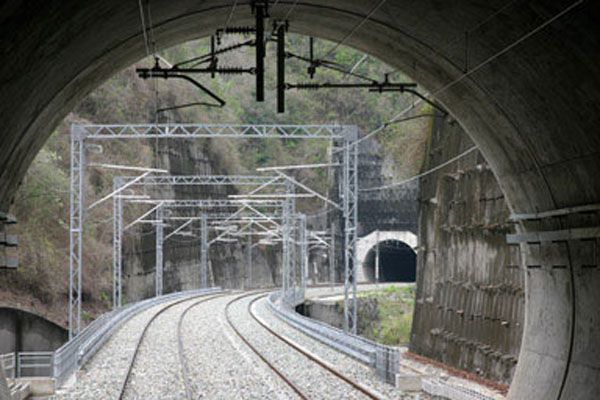
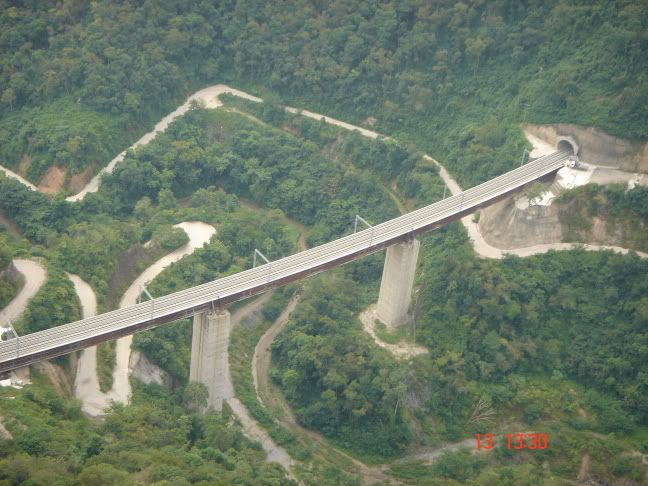
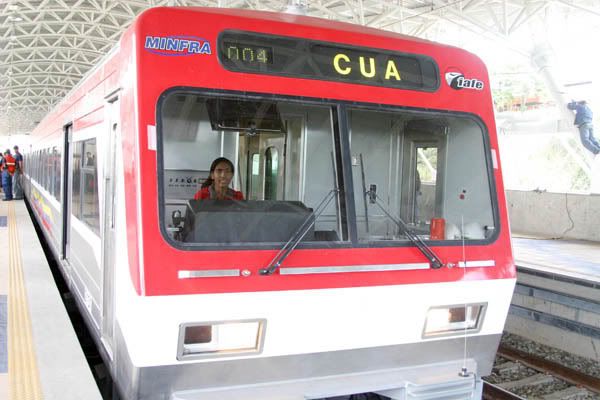
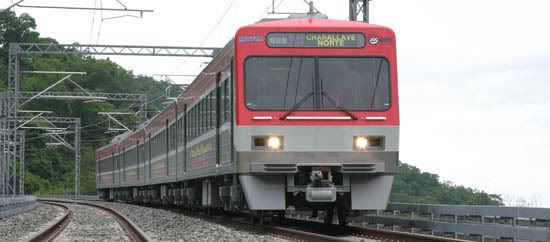
To help ease overcrowding he has built two new subway lines in Caracas and has expanded another:
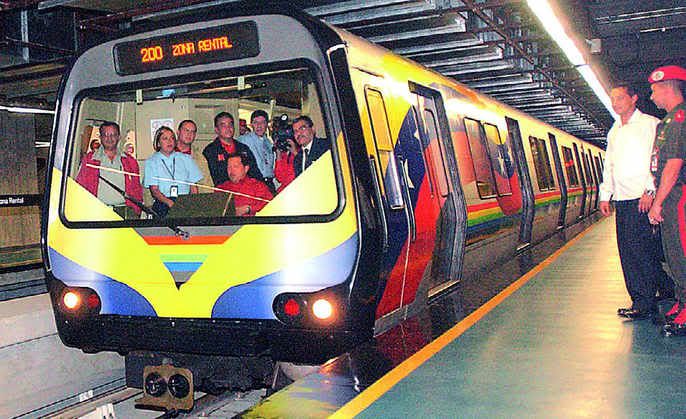
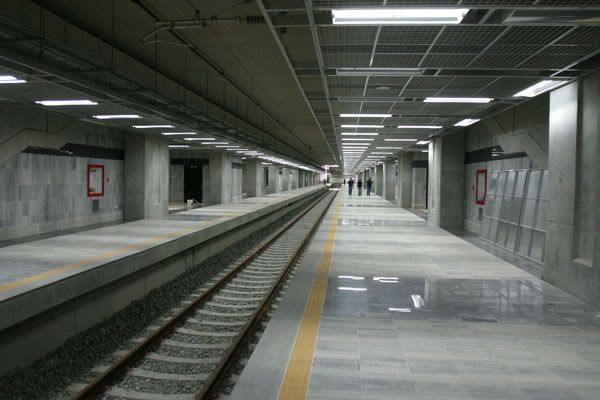
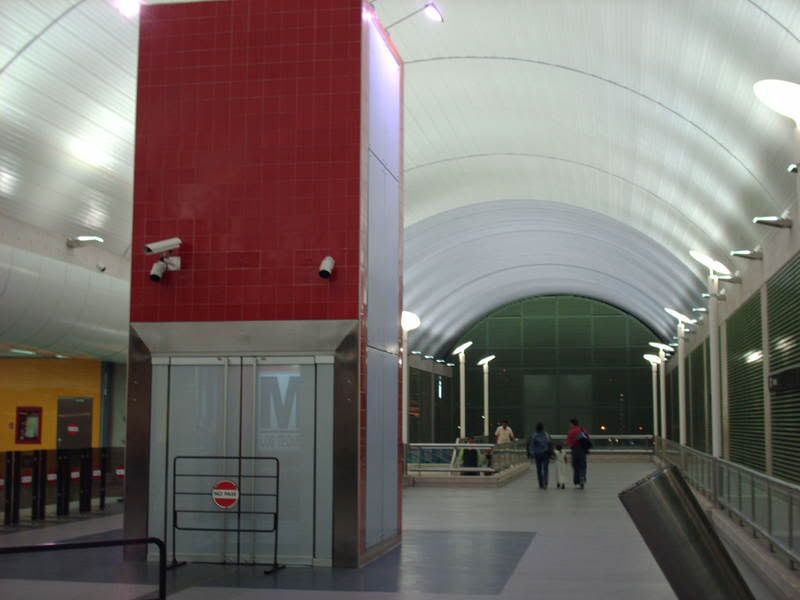
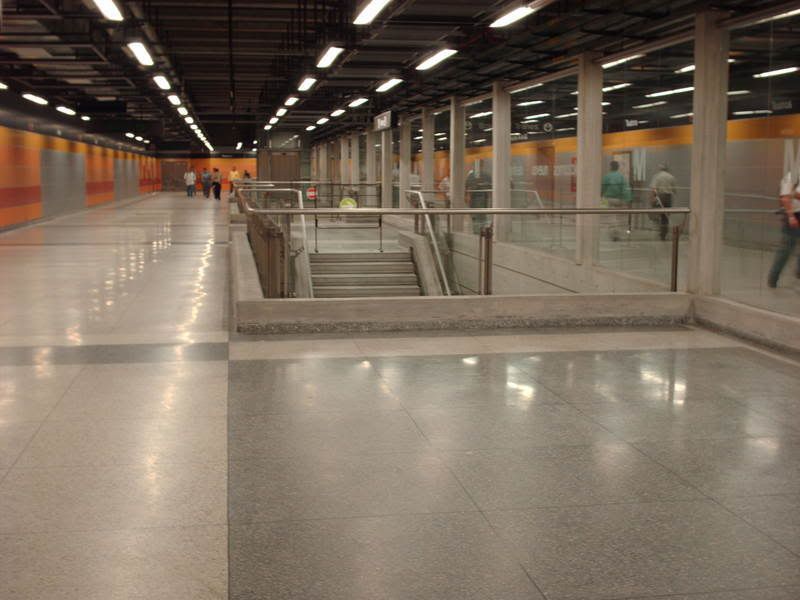
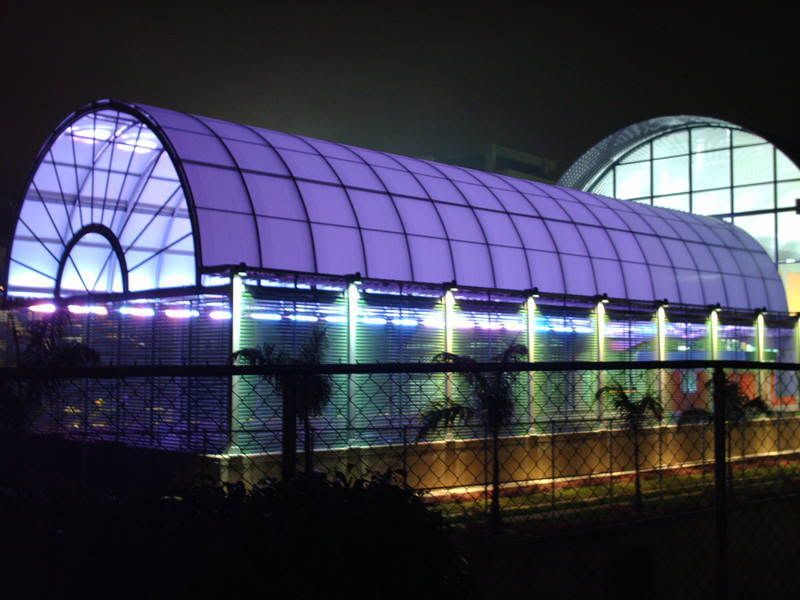
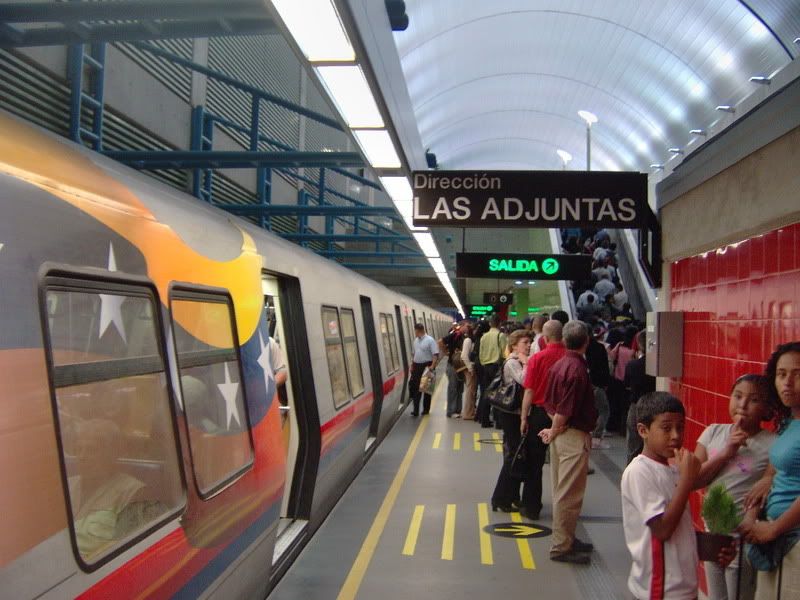
Mass transit has for the first time expanded outside of Caracas (the only city previous governments ever seemed to care about ).
Venezuela’s third largest city, Valencia, now has a subway
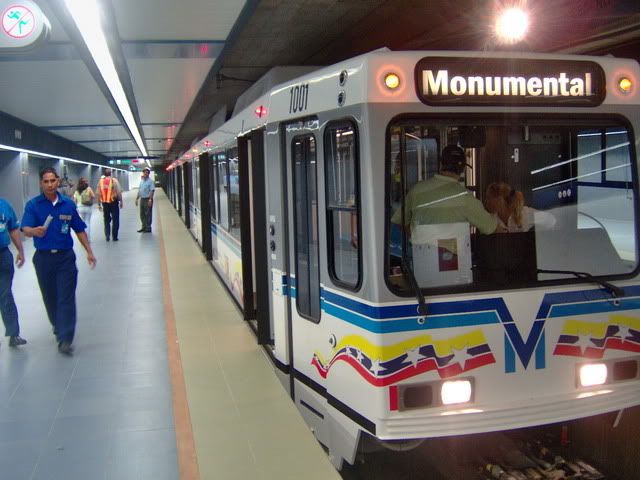
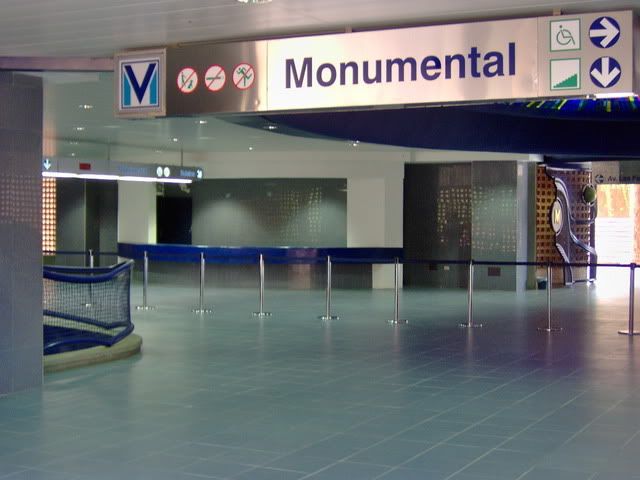
Not to be outdone, a few weeks later Venezuela’s second largest city got its own subway
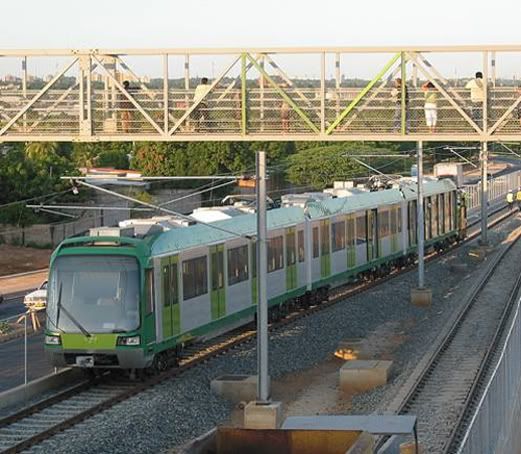
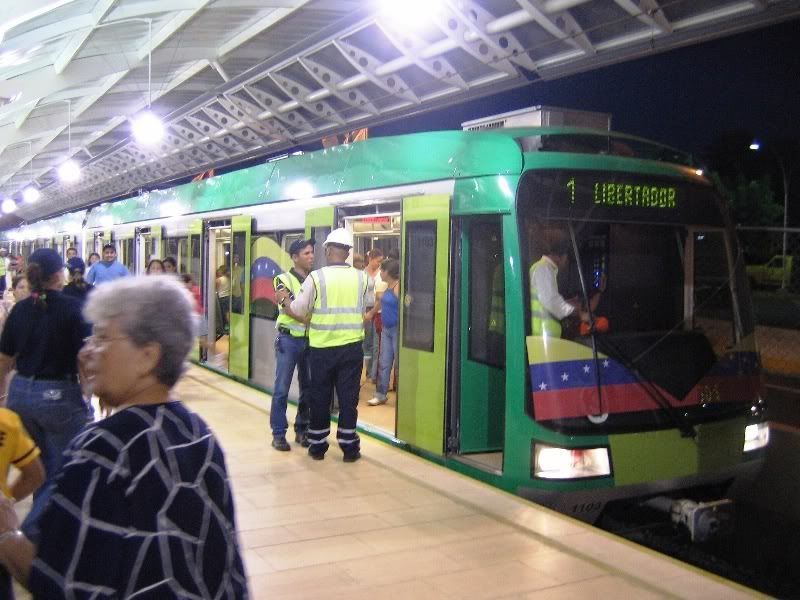
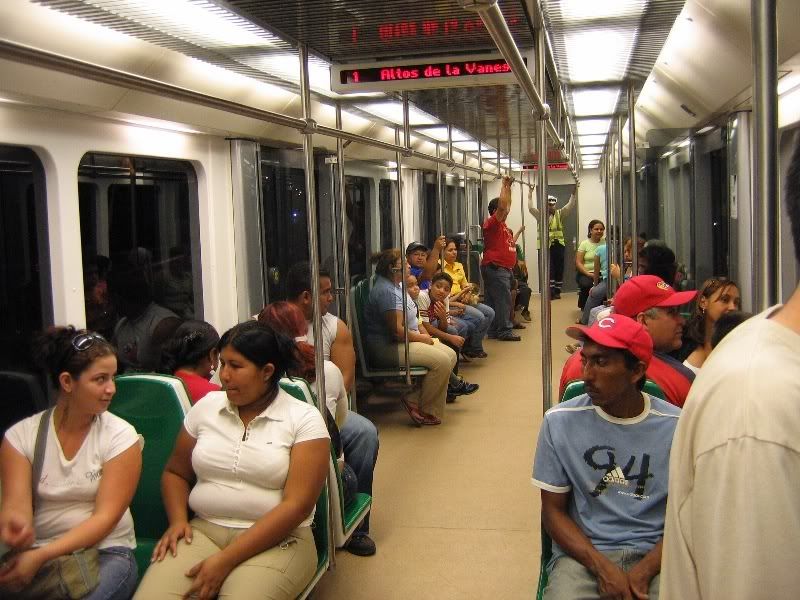
And Merida, a university city up in the Andes, got a trolley bus system (now open!)
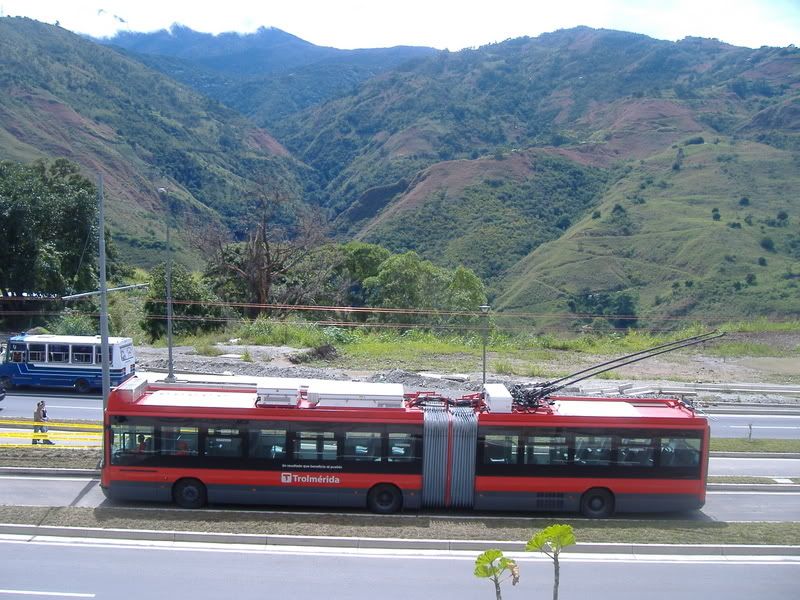
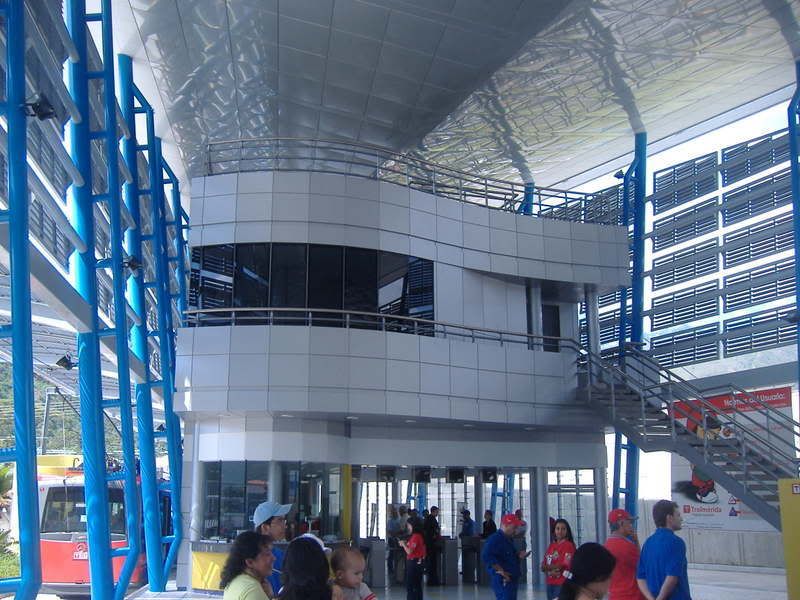
His government built a spectacular bridge over the Orinoco river uniting seperate parts of the country:
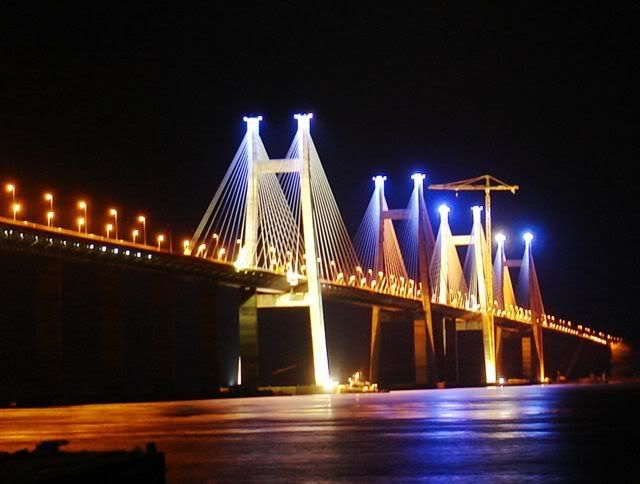
Public spaces in Venezuelan cities which were once decrepit now shine:

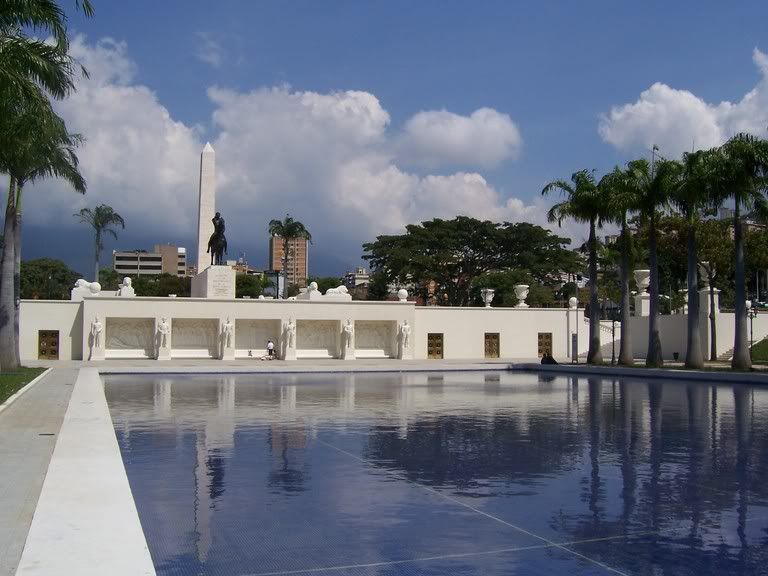
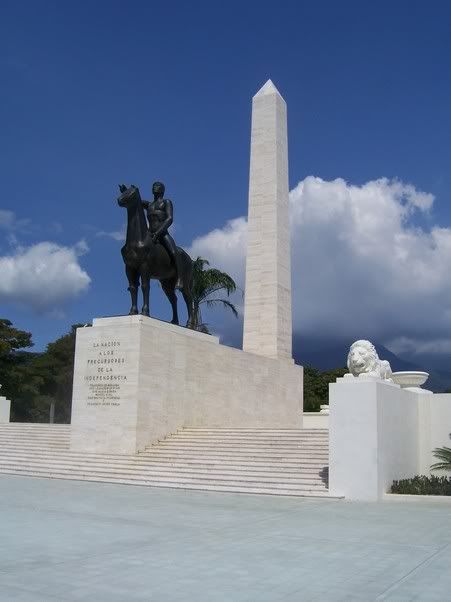
Where ever one looks in Venezuela one see positive change. It may be rather ironic, but if Ronald Reagan were alive he would probably tell Venezuelans they should ask themselves if they are better off now than they were eight years ago. The answer of most Venezuelans would be a resounding yes and it is for that reason that Chavez will most likely have a resounding victory.
|
The reason for that really doesn’t have much to do with what Chavez has said or promised to do, nor even with whatever emotions he has inspired. Rather, most Venezuelans appreciate what Chavez has accomplished over the past eight years. Lets look at what some of those accomplishments have been.
In 1999 Chavez inherited a country very much headed in the wrong direction. The previous decades had seen poverty increasing, the economy stagnating, a hyper-corrupt business/political class looting the country and violent repression of dissent.
Yet as bad as things were there is no indication they had even hit bottom. The economy was literally shrinking before Chavez took office which was largely the result of self-defeating oil policies that wasted billions of dollars on money losing investments while sending the price of oil through the floor.
As soon as Chavez came to office he fired those responsible for the disasterous policies, revitalized OPEC, started raising taxes and royalties on oil companies, and ever since Venezuela has been reaping the benefit of steadily rising oil prices:

Rising oil prices have brought windfall revenues which returned the state oil company, PDVSA, to levels of profitability not seen in decades. This in turn has fueled dramatic economic growth over Chavez’s turn. The economy has stumbled when the opposition has led coups and oil strikes but when the country has been calm, as it has been over the past three years, it has prospered under Chavez.

Most all of Venezuela’s economic indicators have turned highly positive.
Inflation, which was up to 100% a year under the previous government, has been tamed:

Public debt in relation to GDP is declining and is less than when he came to office:

Foreign reserves of hard currency are at an all time high and more than double the level of when he came to office:

Hundreds of thousands of new jobs have been created (mainly in the private sector) with almost 400,000 being added in the past year alone as this graphic shows:

Consumption of Venezuelan consumers has reached levels not seen since the early 1980s (it is actually off this chart!):

This does has its down side though, as record auto sales have left Venezuelan streets jammed with new cars

What have all these good economic numbers done your average Venezuelan? Simple, they have boosted their standard of living significantly. The lowest social classes have seen their real income rise dramatically:

For more details see here and here.
Poverty, in spite of going up after the opposition led oil strike has gone down dramatically recently with 37% of Venezuelans now being poor compared to 47% before Chavez came to office:

Of course, Chavez hasn’t been content just to let oil revenues go up, he has also taken the novel approach of actually collecting taxes from Venezuelan business people.

All of this means that not only do average Venezuelans have a lot more money in their pockets but so does the government. And what has the government done with all that money. See for yourself.
It has set about building dignified housing for people. Previous public housing was junk that often wound up like these never used buildings in Barquisimeto:

By way of contrast the housing build now is attractive and durable:

And it is even nicer on the inside than it is on the outside

Which housing would you prefer to live in?
He has set up thousands of low cost stores throughout Venezuela and had them well stocked with staples of everyday life and needed medications. Almost half the Venezuelan population benefits from these reduced price stores:



He has built literally hundreds of new medical facilities chock full of state of the art equipment and given millions of Venezuelans access to modern health care for the first time in their lives.


He has built scores of new universities and schools while renovating others:



He has built massive hydroelectric plants that will reduce dramatically the amount of oil Venezuela has to consume internally:

And no sooner does he finish one than he begins another:

He tunneled through mountains and bridged ravines to begin the process of linking Venezuelan cities by rail:




To help ease overcrowding he has built two new subway lines in Caracas and has expanded another:






Mass transit has for the first time expanded outside of Caracas (the only city previous governments ever seemed to care about ).
Venezuela’s third largest city, Valencia, now has a subway


Not to be outdone, a few weeks later Venezuela’s second largest city got its own subway



And Merida, a university city up in the Andes, got a trolley bus system (now open!)


His government built a spectacular bridge over the Orinoco river uniting seperate parts of the country:

Public spaces in Venezuelan cities which were once decrepit now shine:



Where ever one looks in Venezuela one see positive change. It may be rather ironic, but if Ronald Reagan were alive he would probably tell Venezuelans they should ask themselves if they are better off now than they were eight years ago. The answer of most Venezuelans would be a resounding yes and it is for that reason that Chavez will most likely have a resounding victory.
|
Friday, December 01, 2006
Lest we forget, four short years ago
Even for those who remember it well, the opposition attempt to overthrow the democratically elected government of Hugo Chavez by shutting down the oil industry seems like ages ago. So much has changed that it is hard to believe those events were only four year ago this month. Yet as PDVSA reminds us today, they were:
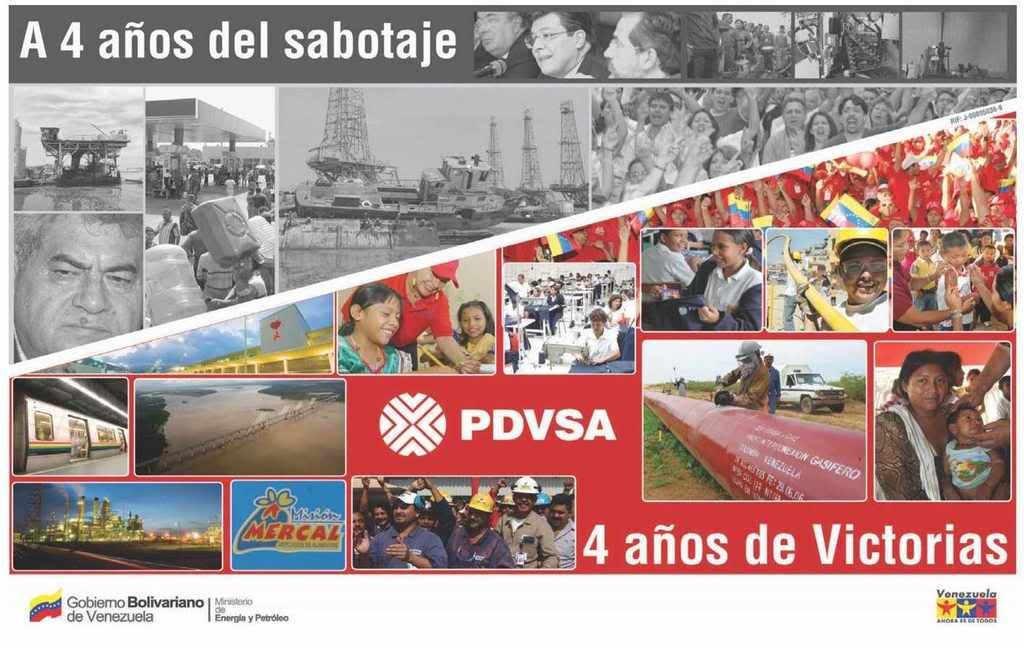
And how true this ad is "Fours years from sabotage, we have four years of victories.
Indeed, after the Venezuelan opposition finished trashing Venezuela and its economy it would have been impossible to imagine that in only a few years Venezuela would have so many impressive new public works, a booming job market, reduced poverty, scores of new social programs called "Missions", and newfound hope and optomism for the country. And who would have thought the Venezuelan oil industry could have rebuilt itself so completely? Yet it has.
I guess this shows that events are unpredictable and that when things to seem to be at their worst, things often are about to turn turn for the better. There is a lesson here for Chavismo should it win on Sunday - the one thing there should never be any place for in the revolution is complacency.
Complaceny isn't what built PDVSA back up after the opposition tried to burn it to the ground - hard work is. And hard work that took oil, which previously only benefited the few, and turned it into something from which the whole country reaps big benefits. Come December 4th, there will be nothing but more hard work waiting for Venezuelans. But if the past four years is any indication, they are up for the task.
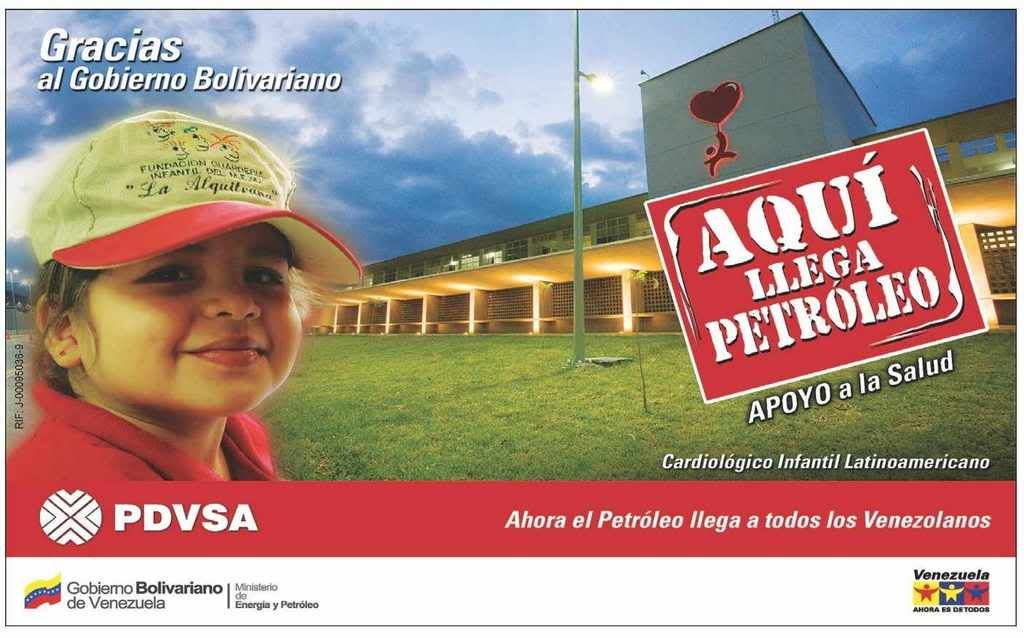
|

And how true this ad is "Fours years from sabotage, we have four years of victories.
Indeed, after the Venezuelan opposition finished trashing Venezuela and its economy it would have been impossible to imagine that in only a few years Venezuela would have so many impressive new public works, a booming job market, reduced poverty, scores of new social programs called "Missions", and newfound hope and optomism for the country. And who would have thought the Venezuelan oil industry could have rebuilt itself so completely? Yet it has.
I guess this shows that events are unpredictable and that when things to seem to be at their worst, things often are about to turn turn for the better. There is a lesson here for Chavismo should it win on Sunday - the one thing there should never be any place for in the revolution is complacency.
Complaceny isn't what built PDVSA back up after the opposition tried to burn it to the ground - hard work is. And hard work that took oil, which previously only benefited the few, and turned it into something from which the whole country reaps big benefits. Come December 4th, there will be nothing but more hard work waiting for Venezuelans. But if the past four years is any indication, they are up for the task.

|
Thursday, November 30, 2006
Coming to a voting booth near you?
Everyone has probably heard many times by now that when Venezuelans go to vote on Sunday they will be voting with touch screen computers. At witch American readers gasp and think of those vote eating black boxes they are used to.
Well, not really. See in Venezuela, after you vote you actually get a nice printed receipt showing exactly how you voted:
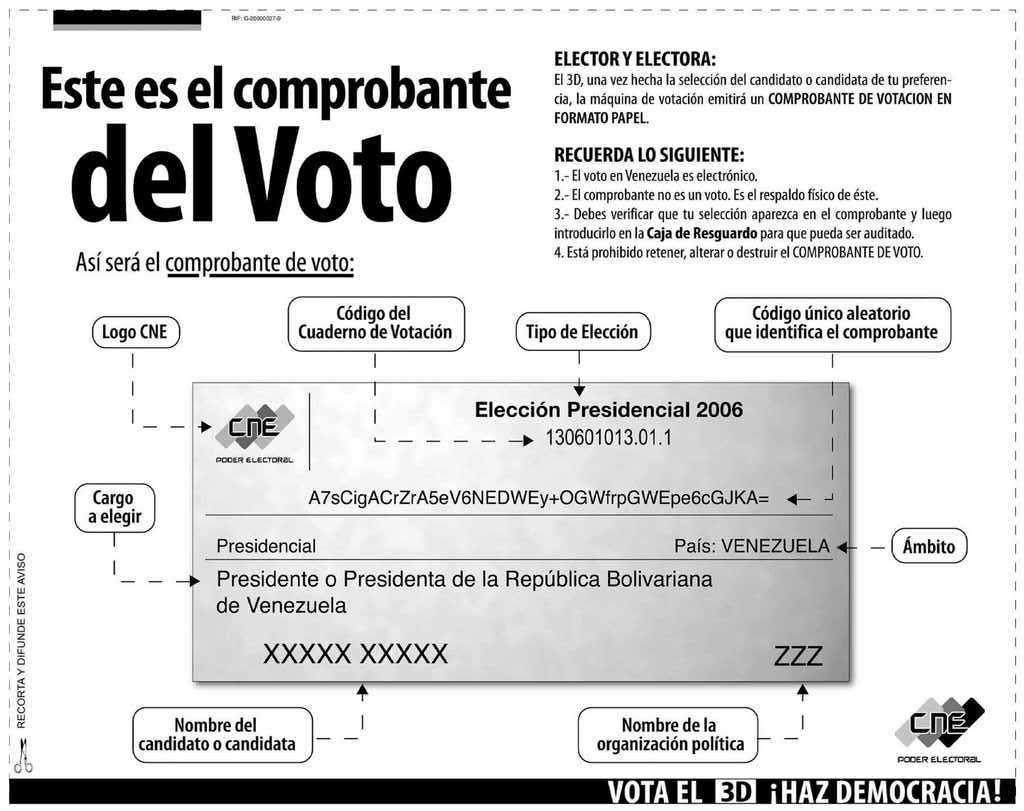
Now, you don’t get to keep this receipt as a souvenir. Rather you have to deposit it in a box with everyone else’s, more than half of which will later be opened and counted to make sure the machine tally’s are correct. Moreover, given all the unique random codes put on the receipt which are also on the tally sheet and computers memory stick these ballots would be very difficult to dummy up even in the event you want to do a “cold” audit days or weeks after the election.
So good is this Venezuelan voting system that the country which most hates and despises the Venezuelan government seems hell bent on copying it. From today’s Wall Street Journal:
It seems that while U.S. elected officials often have not so nice things to say about the Venezuelan government they know a really good system when they see it. Hence there willingness to copy the Venezuelan system virtually lock stock and barrel. It certainly would represent a vast improvement over the voting systems most Americans currently use.
|
Well, not really. See in Venezuela, after you vote you actually get a nice printed receipt showing exactly how you voted:

Now, you don’t get to keep this receipt as a souvenir. Rather you have to deposit it in a box with everyone else’s, more than half of which will later be opened and counted to make sure the machine tally’s are correct. Moreover, given all the unique random codes put on the receipt which are also on the tally sheet and computers memory stick these ballots would be very difficult to dummy up even in the event you want to do a “cold” audit days or weeks after the election.
So good is this Venezuelan voting system that the country which most hates and despises the Venezuelan government seems hell bent on copying it. From today’s Wall Street Journal:
Touch Screens? Vote Yes or No
By June Kronholz
With 2008 on the horizon, the House seems likely to quickly pass a long-stalled bill that would tighten the security of touch screen voting. California Sen. Dianne Feinstein, who will head the rules committee in the new Democratic-controlled Senate, has announced hearings on an identical measure.
That legislation would require that touch screens provide a paper record of each ballot and a random audit of a fraction of those records to verify that votes are being counted correctly. [Venezuela already does this and if the U.S. adopts it they should demand royalty payments for their intellectual property or sue - ow ]
……………………….
Congress might have to pay for any modifications it mandates, like printer attachments to collect backup paper records. Diebold Inc. of North Canton Ohio, says its touch screens could be fitted with printers and the software that runs them for about $400 to $500 each. But any supplemental money is likely to be modest because of competing priorities, Democratic staffers predict.
With only a few buyers left in the market, the dozen-or-so voting machine vendors are likely to consolidate, eventually leaving only three or four, says Doug Lewis of the Election Center, an association of election officials. They’re also unlikely to devote time or resources on new touch-screen models if they expect few sales.
Instead, Diebold will concentrate on new products, including an electronic poll book that replaces paper lists of voters’ names, says Mark Radke, marketing manager for Diebold’s election unit [Venezuela also already has this too! – ow].
It seems that while U.S. elected officials often have not so nice things to say about the Venezuelan government they know a really good system when they see it. Hence there willingness to copy the Venezuelan system virtually lock stock and barrel. It certainly would represent a vast improvement over the voting systems most Americans currently use.
|
Wednesday, November 29, 2006
Who's scared of Chavez, obviously not the head of the UCV
As an interesting follow up to the previous post which debunked one of the most common myths about how there is supposedly political persecution in Venezuela here is an article that appeared in today's edition of Ultimas Noticias:
Now without translating the entire article let me point out what is being said. The article quotes the rector of the Universidad Central de Venezuela, the largest University in Venezuela and a public one at that, as saying people shouldn't trust the observers to ensure the integrity of the election but rather need to carefuly observe what happens themselves. So far, so good.
He then goes on to say people have to go out and vote to "change the disaster we have." Ok, obsiously the guy isn't afraid to bite the hand that feeds him. But it gets even better. He sees a "black future" for "autonomous" universities if Chavez is re-elected He then concludes by saying "In the UCV [Universidad Central de Venezuela] the beret we use is blue, not red".
Wow, so here is the head of the largest government run and financed university saying that university is with opposition candidate Rosales (whose color is blue) and not with Chavez (famously red).
And here the opposition has spent years telling us A) that government employees that oppose Chavez have been fired B) that it is the Chavez people who abuse their public positions to further their political agenda and C) that people in Venezuela, and in particular government employees, are afraid to speak out against the government. Here we have all three of those notions shown to be false in one fell swoop.
So much for believing what the opposition says.
|
París pide no confiarse por presencia de observadores
NOTICIAS
Caracas. El rector de la Universidad Central de Venezuela, Antonio París, dijo que no hay que confiarse por la presencia de los observadores internacionales de la OEA, la Unión Europea y el Centro Carter, porque los votos tienen que ser defendidos por los venezolanos.
Expresó que se ha dado cuenta de que la gente no tiene miedo y no debe hacerle caso a los rumores y salir a votar el próximo domingo "para cambiar el desastre que tenemos".
El rector indicó que la gente tiene quedarse en los centros de votación después de votar, siempre y cuando el espacio físico lo permita, y añadió que no se puede prohibir que la gente se reúna. París afirmó sobre este tema que la Presidenta del CNE, Tibisay Lucena, está equivocada.
Ve un "futuro negro" para las universidades autónomas si repite el presidente Chávez.
"En la UCV se usa la boina azul y no la roja", dijo.
Now without translating the entire article let me point out what is being said. The article quotes the rector of the Universidad Central de Venezuela, the largest University in Venezuela and a public one at that, as saying people shouldn't trust the observers to ensure the integrity of the election but rather need to carefuly observe what happens themselves. So far, so good.
He then goes on to say people have to go out and vote to "change the disaster we have." Ok, obsiously the guy isn't afraid to bite the hand that feeds him. But it gets even better. He sees a "black future" for "autonomous" universities if Chavez is re-elected He then concludes by saying "In the UCV [Universidad Central de Venezuela] the beret we use is blue, not red".
Wow, so here is the head of the largest government run and financed university saying that university is with opposition candidate Rosales (whose color is blue) and not with Chavez (famously red).
And here the opposition has spent years telling us A) that government employees that oppose Chavez have been fired B) that it is the Chavez people who abuse their public positions to further their political agenda and C) that people in Venezuela, and in particular government employees, are afraid to speak out against the government. Here we have all three of those notions shown to be false in one fell swoop.
So much for believing what the opposition says.
|
Maisanta: Micro-targetting Venezuelan style
This is an overdue post on some long standing opposition propaganda regarding one of Chavez’s campaign tools. However, given that we are now days away from one of the biggest elections in Venezuela’s history it is more than appropriate to post on now.
Last year some opposition supporters claimed to find what they called “irrefutable proof” of political persecution in Venezuela. This was splashed all over the blogosphere and even made it into video form and a book! Sounds serious. And indeed it would be serious if there was some proof of political persecution in Venezuela. So what was the proof? Here it is:

This is a screen shot of a computer of a computer database program that goes by various names but is generally called “Maisanta”. And does this database serve to identify “enemies of the revolution”? In a way sort of, but not really.
What this database really has as its purpose is nothing more outrageous and threatening than identifying potential pro-Chavez voters for get out the vote efforts. To see how it does this lets look at what information it actually supplies. First it has basic things like name, address, and birth date. It also includes information on what the persons polling location is. All of that is fairly innocuous.
But then we get to the heart of the database. On the bottom left it tells if the person is still alive (?!?), if they have a history of not voting, and, more importantly, if they have participated in some of Chavez’s social programs called “Missions”.
Clearly a program that identifies who participates in the “Missions” isn’t a program intended to discriminate against people – why would the government want to discriminate against people who participated in the Missions, or for that matter people who don’t participate in the Missions? Rather what this leads to is the real purpose of this program – identifying potential Chavez voters for get out the vote efforts.
Chavez, like any politician, needs organized campaign efforts if he is to have an chance of winning elections. And one of those efforts that is used to maximize his chances of winning elections are databases that pull together various types of information to identify people who might be inclined to vote for him. After all, if you are going door to door to get people to vote you only want to knock on people’s doors who you have reason to believe might vote for you. Hence the Maisanta database.
Is there something inherently pernicious or anti-democratic about this? Not at all. In fact, it is something that has been turned into a virtual science in that great laboratory of democracy called the United States. They have even coined a term for it – “micro-targetting” – as the following Wall Street Journal article points out:
Reading this article what comes to mind is – “poor Chavistas, in the U.S. these programs have 500 data fields on people and they only have a dozen at most!”. Indeed, the quantity of information collected for electoral purposes in the U.S. is stunning. But given the importance people attach to winning elections it should come as no surprise that people seek to give themselves any advantage they can. And certainly in Venezuela, where if anything the stakes are even higher, there is even more of a premium to these types of efforts.
So rather than looking at a tool designed for political persecution as silly and unknowing opposition propagandists claim we are looking at the exact same type of electoral program as is used in the United States – if a good deal less sophisticated.
Want more evidence of what the true purpose of this software just look at the “read me” file that comes with it:
Batalla de Santa Inés Versión 1.10
----------------------------------
Es un sistema de computación que integra en una sola base de datos toda la información mínima y necesaria para la gestión electoral. Su desarrollo es dinámico diariamente se incorporan nuevas funcionalidades e información obtenidas de diversas bases de datos que contribuyen a conocer ampliamente el panorama electoral en forma regional, partiendo desde Estado, municipio parroquia y centro de votación.
Su función es facilitar consultas en forma personal o en grupo de ciudadanos de un centro de votación o cualquier comunidad. Sirve de apoyo a la misión y visión de la sbatalla de Santa Inés.
La necesidad de crear ésta solución nace por diferentes razones.
1. Democratizar el acceso a la información.
2. Lograr que los sectores populares tenga acceso a la información.
3. Participar como contralor en los procesos electorales.
4. Evitar el fraude electoral.
5. Motivar la participación electoral.
6. Cuantificar la cantidad de electores de uno o varios centros de votación.
7. Ofrecer información y orientación al elector.
8. Ubicar votantes con tan solo indicar Nombres y Apellidos.
9. Acceder a la información sin necesidad de utilizar Internet, debido a la carencia de servicio en gran parte del territorio nacional y en los sectores populares.
10. Apoyo técnico que se integra a la labor de las Patrullas (UBE)
11. Comodidad para realizar las labores de consulta en Casa.
12. Ofrecer servicios de consulta a los vecinos de tu comunidad.
13. Evitar el traslado de los patrulleros de la UBE hacia centros de navegación ahorrándoles costos y tiempo.
14. Bajo requerimientos técnicos, puede operar desde computadoras de bajo rendimiento hasta los computadores más sofisticados.
What does this say? Among other things – 4) avoid electoral fraud 5) motivate electoral participation 7) offer information and orient electors 10) provide techinical support to the get out the vote patrols 13) avoiding the need for campaign workers to go to Internet centers saving money and time – among other things. In short, this software exists to help pro-Chavez campaign workers identify people who are likely to support Chavez, such as those who have participated in the Missions, and get them to vote. That is what demrocracy is all about, getting people to vote for your side. So rather than evidence of repression the existence of this software is evidence of a living, breathing, thriving democracy in Venezuela and Chavez’s attempts to win through the democratic process.
Of course a final point is in order. One data field contained in this software is particularly controversial – and that is the field which identifies who signed the recall petition against Chavez in 2004. To have this information in this database, it is asserted, is somehow a violation of peoples rights and evidence of discrimination. Again, this is simply not the case. Who signed the petitions against Chavez is a matter of public record. Chavez, as the subject of the petition, was allowed to challenge it by reviewing the petitions so he, and who ever he delegated this responsibility to, had the right to review who had signed. Indeed by doing this many thousands of fraudulent signatures were discovered. So these signatures are by no means secret.
Why are they in this database? The real question is why not. Can you think of any single indicator of a persons likely voting preferences regarding Chavez than if they wanted him recalled in 2004? And if you were a Chavez campaign worker would you want to give a ride to the polls to a person who had signed against Chavez? That probably wouldn’t be a smart move, would it? So in fact the inclusion of that data is entirely appropriate and undoubtedly of great assistance to the Chavez campaign.
This of course leads to the question of has this been used to single out people for political discrimination in Venezuela. First, lets say that it clearly could be used for that purpose. Anything that can be used to identify peoples political tendencies can be used to discriminate. So the “micro-targetting” databases in the U.S. could also be used for that purpose. Has Maisanta been used in that way? In a country of 26 million people there is little doubt that it probably has been used inappropriately by overzealous government officials and supporters. And that is deplorable. But to make the leap from isolated misuses of a software which has entirely appropriate political uses to saying it is an intended tool of repression is simply not in line with the facts. Like many things with legitimate uses it can be inappropriately used by those so inclined - but that is not its purpose.
The Maisanta software is NOT “irrefutable proof” of political persecution in Venezuela. Rather, it is irrefutable proof of democracy and electoral politics in Venezuela. It shows Chavez tries to win open and contested elections. And that is what it is all about.
|
Last year some opposition supporters claimed to find what they called “irrefutable proof” of political persecution in Venezuela. This was splashed all over the blogosphere and even made it into video form and a book! Sounds serious. And indeed it would be serious if there was some proof of political persecution in Venezuela. So what was the proof? Here it is:

This is a screen shot of a computer of a computer database program that goes by various names but is generally called “Maisanta”. And does this database serve to identify “enemies of the revolution”? In a way sort of, but not really.
What this database really has as its purpose is nothing more outrageous and threatening than identifying potential pro-Chavez voters for get out the vote efforts. To see how it does this lets look at what information it actually supplies. First it has basic things like name, address, and birth date. It also includes information on what the persons polling location is. All of that is fairly innocuous.
But then we get to the heart of the database. On the bottom left it tells if the person is still alive (?!?), if they have a history of not voting, and, more importantly, if they have participated in some of Chavez’s social programs called “Missions”.
Clearly a program that identifies who participates in the “Missions” isn’t a program intended to discriminate against people – why would the government want to discriminate against people who participated in the Missions, or for that matter people who don’t participate in the Missions? Rather what this leads to is the real purpose of this program – identifying potential Chavez voters for get out the vote efforts.
Chavez, like any politician, needs organized campaign efforts if he is to have an chance of winning elections. And one of those efforts that is used to maximize his chances of winning elections are databases that pull together various types of information to identify people who might be inclined to vote for him. After all, if you are going door to door to get people to vote you only want to knock on people’s doors who you have reason to believe might vote for you. Hence the Maisanta database.
Is there something inherently pernicious or anti-democratic about this? Not at all. In fact, it is something that has been turned into a virtual science in that great laboratory of democracy called the United States. They have even coined a term for it – “micro-targetting” – as the following Wall Street Journal article points out:
Democrats, Playing Catch-Up, Tap Database to Woo Potential Voters.
Yochi Dreazen
WASHINGTON—In the final week before the election, Democrats pushing to convert their lead in the polls into control of Congress are pinning their hopes of success on an increasingly common tactic for pumping up voter turnout: microtargeting.
The technique aims to identify potential supporters by collecting and analyzing the unprecedented amount of information now readily available—from census data to credit-card bills—to profile individual voters. Political strategists then tailor messages to entice those prospects to the polls, using the same methods marketers use to sell autos or aspirin to consumers.
………………………….
Democrats are playing catch-up to Republicans, whose use of microtargeting in 2004 energized millions of new voters who backed President Bush. Republicans have since expanded their database in size and sophistication, even as formerly skeptical Democrats have spent millions of dollars building microtargeting systems of their own.
………………………
Copernicus's chief scientist, Ben Yuhas, likens microtargeting to searching for a needle in a haystack—over and over again. The spreadsheet on a single voter from one of the states where Copernicus is operating contains more than 500 rows of information, ranging from whether a prospect lives in an apartment or house to commercially purchased data on the type of car the voter drives. Mr. Yuhas has developed mathematic formulas based on such factors as length of residence, amount of money spent on golf, voting patterns in recent elections and a handful of other variables to calculate the likelihood that a particular American will vote Democratic.
………………………………
Republicans have long outstripped Democrats in their support for, and use of, the technique—an edge the Republicans hope to maintain this election. Today, Republicans use a centralized computer system called Voter Vault that is available to Republican candidates across the country. TargetPoint executives hold monthly conference calls with top Republican operatives such as White House political director Sara Taylor. The Republican National Committee now has data covering tens of millions of voters from across the country, to which TargetPoint has access. In 2004, the firm had such a comprehensive database only for Ohio.
Reading this article what comes to mind is – “poor Chavistas, in the U.S. these programs have 500 data fields on people and they only have a dozen at most!”. Indeed, the quantity of information collected for electoral purposes in the U.S. is stunning. But given the importance people attach to winning elections it should come as no surprise that people seek to give themselves any advantage they can. And certainly in Venezuela, where if anything the stakes are even higher, there is even more of a premium to these types of efforts.
So rather than looking at a tool designed for political persecution as silly and unknowing opposition propagandists claim we are looking at the exact same type of electoral program as is used in the United States – if a good deal less sophisticated.
Want more evidence of what the true purpose of this software just look at the “read me” file that comes with it:
Batalla de Santa Inés Versión 1.10
----------------------------------
Es un sistema de computación que integra en una sola base de datos toda la información mínima y necesaria para la gestión electoral. Su desarrollo es dinámico diariamente se incorporan nuevas funcionalidades e información obtenidas de diversas bases de datos que contribuyen a conocer ampliamente el panorama electoral en forma regional, partiendo desde Estado, municipio parroquia y centro de votación.
Su función es facilitar consultas en forma personal o en grupo de ciudadanos de un centro de votación o cualquier comunidad. Sirve de apoyo a la misión y visión de la sbatalla de Santa Inés.
La necesidad de crear ésta solución nace por diferentes razones.
1. Democratizar el acceso a la información.
2. Lograr que los sectores populares tenga acceso a la información.
3. Participar como contralor en los procesos electorales.
4. Evitar el fraude electoral.
5. Motivar la participación electoral.
6. Cuantificar la cantidad de electores de uno o varios centros de votación.
7. Ofrecer información y orientación al elector.
8. Ubicar votantes con tan solo indicar Nombres y Apellidos.
9. Acceder a la información sin necesidad de utilizar Internet, debido a la carencia de servicio en gran parte del territorio nacional y en los sectores populares.
10. Apoyo técnico que se integra a la labor de las Patrullas (UBE)
11. Comodidad para realizar las labores de consulta en Casa.
12. Ofrecer servicios de consulta a los vecinos de tu comunidad.
13. Evitar el traslado de los patrulleros de la UBE hacia centros de navegación ahorrándoles costos y tiempo.
14. Bajo requerimientos técnicos, puede operar desde computadoras de bajo rendimiento hasta los computadores más sofisticados.
What does this say? Among other things – 4) avoid electoral fraud 5) motivate electoral participation 7) offer information and orient electors 10) provide techinical support to the get out the vote patrols 13) avoiding the need for campaign workers to go to Internet centers saving money and time – among other things. In short, this software exists to help pro-Chavez campaign workers identify people who are likely to support Chavez, such as those who have participated in the Missions, and get them to vote. That is what demrocracy is all about, getting people to vote for your side. So rather than evidence of repression the existence of this software is evidence of a living, breathing, thriving democracy in Venezuela and Chavez’s attempts to win through the democratic process.
Of course a final point is in order. One data field contained in this software is particularly controversial – and that is the field which identifies who signed the recall petition against Chavez in 2004. To have this information in this database, it is asserted, is somehow a violation of peoples rights and evidence of discrimination. Again, this is simply not the case. Who signed the petitions against Chavez is a matter of public record. Chavez, as the subject of the petition, was allowed to challenge it by reviewing the petitions so he, and who ever he delegated this responsibility to, had the right to review who had signed. Indeed by doing this many thousands of fraudulent signatures were discovered. So these signatures are by no means secret.
Why are they in this database? The real question is why not. Can you think of any single indicator of a persons likely voting preferences regarding Chavez than if they wanted him recalled in 2004? And if you were a Chavez campaign worker would you want to give a ride to the polls to a person who had signed against Chavez? That probably wouldn’t be a smart move, would it? So in fact the inclusion of that data is entirely appropriate and undoubtedly of great assistance to the Chavez campaign.
This of course leads to the question of has this been used to single out people for political discrimination in Venezuela. First, lets say that it clearly could be used for that purpose. Anything that can be used to identify peoples political tendencies can be used to discriminate. So the “micro-targetting” databases in the U.S. could also be used for that purpose. Has Maisanta been used in that way? In a country of 26 million people there is little doubt that it probably has been used inappropriately by overzealous government officials and supporters. And that is deplorable. But to make the leap from isolated misuses of a software which has entirely appropriate political uses to saying it is an intended tool of repression is simply not in line with the facts. Like many things with legitimate uses it can be inappropriately used by those so inclined - but that is not its purpose.
The Maisanta software is NOT “irrefutable proof” of political persecution in Venezuela. Rather, it is irrefutable proof of democracy and electoral politics in Venezuela. It shows Chavez tries to win open and contested elections. And that is what it is all about.
|
Tuesday, November 28, 2006
For those who missed the festivities
For those of you who missed the biggest party in Caracas's history this past Sunday here is a little taste of it:
Just remember, according to the opposition all the unhappy souls you see there were apparently only there under duress. Anyways, regardless of who had the bigger rally and who wins the election the Chavistas without a doubt have the better dancers!
|
Just remember, according to the opposition all the unhappy souls you see there were apparently only there under duress. Anyways, regardless of who had the bigger rally and who wins the election the Chavistas without a doubt have the better dancers!
|
Monday, November 27, 2006
Does Venezuela really need more bogus fraud claims?
Reading this I could only think to myself "oh, no".
For the moment, lets ignore the obvious question of why someone "cruising to victory" in the polls would need to steal the election. Lets focus on how exactly he would do it.
In Venezuela virtually everyone will be voting on automated touch screen computers. Now before you go, "ah ha, that is easy to manipulate", lets go a little further.
The machines print out a paper reciept indicating how each person has voted. Voters verify their vote and then deposit their reciepts into slot of a sealed box. As the vote takes place the machines are not connected to the internet or any other devices. Upon completion of the voting the machines print out up to 9 tally sheets so that various election officials get copies and the representatives of the different policitical parties present also get copies.
Only after that has been done will the machine be connected to the national telephone company (CANTV which is a private and generally anti-Chavez telecommunications giant that up until recently was partly owned by Verizon)and transmitted to central computers for tabulation. Now, this part of the process makes the tabulation of the results completely transparent. The Rosales campaign will have copies of ALL the tally sheets and if they didn't ad up to what the electoral authorities (the CNE) said they should that would immediately be known.
Then, after the tally sheets have all been printed, there will be an audit of the voting machines by opening slightly more than 50% of the boxes of reciepts and comparing the number of reciepts in them for each candidate to the number printed on the tally sheets. Everyone who wants to will be able to attend the audit - the number limited only by the physical space of the voting center. The observers of all political parties, including Rosales's, will be guarenteed access. Further, the audit is carried out by the members of the "voting board" who are randomly selected citizens the lists of whom has already been vetted by the Rosales campaign.
The actual machines to be audited will be chosen by writing the numbers of the machines on pieces of paper, putting them in an envelope, shaking the envelope, and having someone draw them blindly out of the envelope.
So for there to be wide-spread, systemic fraud where the machines are altering the vote tally AND for it not to be detected by the audit would be virtually impossible. Thousands of "voting board" members would have to be part of vast conspiracy. And somehow all the pulling papers out of an envelope would have to be rigged and none of the observers notice it. Neither of those things are very plausible.
So on election day there will be safeguards to ensure that the vote counting is accurate - everyone will have copies of the machine by machine vote tallies and more than half of the machines will have their paper trail audited (paper trail? - people in the U.S., eat your hearts out).
All of this is on top of all the audits being carried out over the past weeks on all the electoral equipment. The CNE and the opposition have participated in audits of the voting machines, down to the source code, the fingerprinting machines, the data transission systems, and virtually every other system related to the vote.
With all these systems and safeguards in place, and if they are all followed on election night, how can any fraud be perpatrated? In today's edition of Ultimas Noticias even the opposition spokespeople they quoted had to admit that important safeguards were in place and it would be impossible for fraud to be committed without it being promptly detected.
That said, lets hope all the procedures and audits are carried out December 3rd with no exceptions. Once that is done lets further hope both sides have the maturity to accept the results no matter what they might be. The last thing Venezuela needs is spurious and politically motivated accusations of fraud.
PD
Apologies in advance to non-Spanish speaking readers but the following materials I really don't have time to translate now. Nevertheless, I would like to post them for the record to document what the expected procedures were in case it becomes a matter of dispute come December 4th.
The first item is an advertisement from the CNE in Ultimas Noticias describing the audit procedures:
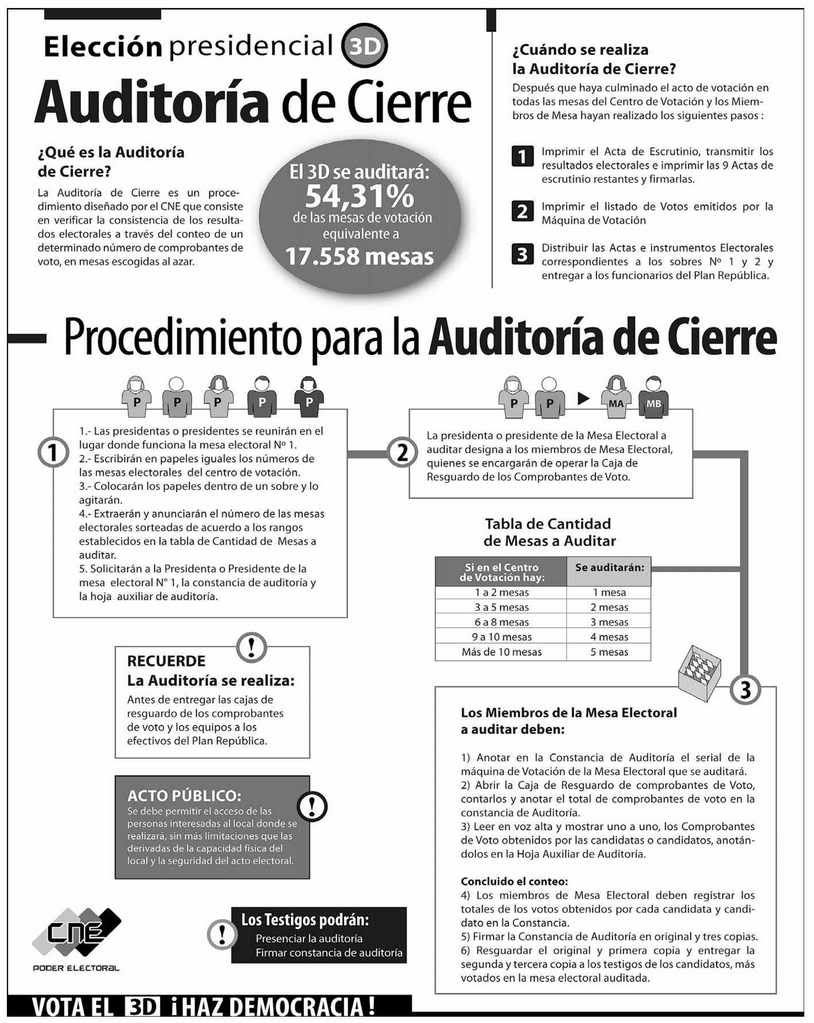
Next is an infogram published by Ultimas Noticias today describing the various pre and post election audits:
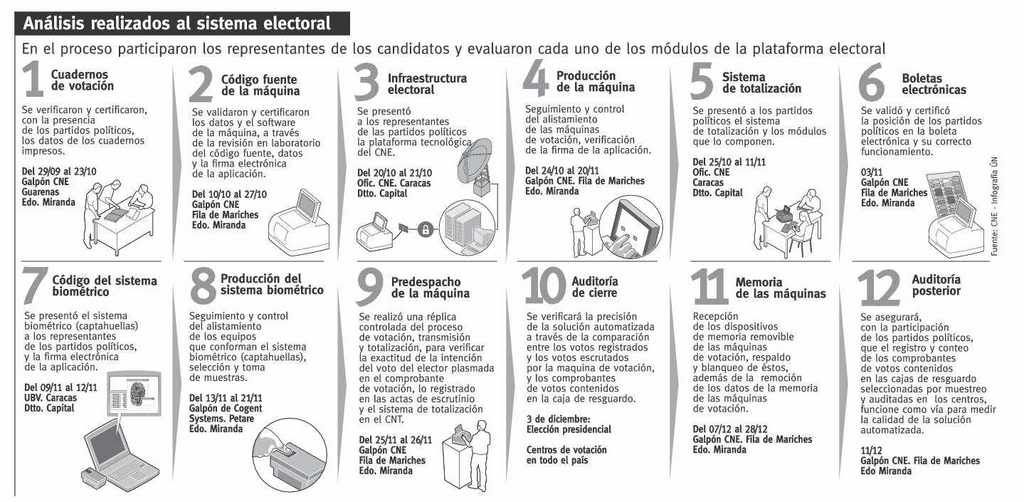
The following are two articles on this from today's Ultimas Noticias:
PRESIDENCIALES EL CNE HA ADELANTADO UNA SERIE DE PROCEDIMIENTOS PARA SALVAGUARDAR LA TRANSPARENCIA DE LOS COMICIOS
Muchos ojos escudriñan la automatización
En el examen que se realizará el 3D contarán los votos unoauno Representantes políticos conformes con todos los ensayos
YNGRID YOHANNA ROJAS
Caracas. El Consejo Nacional Electoral ha adelantado, con la participación de las diversas organizaciones políticas, un proceso de auditorías al sistema electoral, el cual ha sido avalado tanto por las autoridades del ente comicial como por los representantes del oficialismo y la oposición.
Hasta ahora se han desarrollado nueve de las doce etapas de evaluación a la plataforma electoral. En todas las pruebas realizadas los resultados han sido positivos (generalmente cercano a un 100% de efectividad de los procesos) y éstos los han certificados los partidos políticos participantes.
Del proceso de evaluación aún falta la auditoría de cierre, que se llevará a cabo el propio día de las elecciones una vez culminado el proceso de votación; la de la memoria de las máquinas, que se realizará entre el 7 y el 28 de diciembre, y la posterior que se adelantará el 11 de diciembre.
Evaluación de cierre. Es la auditoría que se realiza una vez finalizado el proceso de escrutinio, cuyo objeto principal es verificar la precisión del sistema automatizado, a través de la medición de las eventuales discrepancias entre los votos registrados por la máquina de votación y los comprobantes de voto contenidos en la caja de resguardo de comprobantes de voto.
Esta auditoría se realiza después de que todas las mesas electorales del centro hayan cerrado el proceso de votación, transmitido los resultados electorales e impreso las nueve actas de escrutinio restantes; firmado las actas de escrutinio, impreso el listado de votos emitidos, y llenado y enviado lossobres Nº1yNº2con los efectivos del Plan República.
Esta evaluación constituye un acto público. Se debe permitir el acceso de las personas interesadas al local donde se realizará, sin más limitaciones que las derivadas de la capacidad física establecida para el uso de dicho local y la seguridad del acto electoral.
Los pasos para realizar esta auditoría son los siguientes: los presidentes de las mesas electorales se reunirán en el lugar donde funciona la Mesa Electoral N° 1 en el centro de votación, en presencia de los testigos y observadoras u observadores nacionales e internacionales, si los hubiere, y procederán a sortear las mesas electorales en las cuales se practicará la auditoría del sistema automatizado.
Luego escribirán en papeles iguales los números de las mesas electorales que funcionaron en el centro de votación, en secuencia ordinal comenzando con el número 1. Colocarán los papeles dentro de un sobre y lo agitarán. Extraerán y anunciarán el número de la mesa electoral sorteada, de acuerdo con los rangos establecidos según la cantidad de mesas del centro.
Los presidentes de las mesas electorales sorteadas solicitarán al presidente de la Mesa Electoral 1 las Constancias de Auditoría y Hojas Auxiliares de Auditoría y seleccionarán dos miembros de su mesa electoral para operar las cajas de resguardo de comprobante de voto, quienes deberán abrir la caja respectiva y comenzarán a contar todas las papeletas.
El conteo se realizadelasiguiente manera: se totaliza el total de comprobantes de voto y se anota en el renglón correspondiente en la Constancia de Auditoría. Se lee en voz alta y se muestran, uno a uno, los comprobantes de voto expresando claramente el voto emitido para cada candidato.
Una vez leído cada comprobante de voto, se anota el resultado en la Hoja Auxiliar de Auditoría.
Los miembros de las mesas electorales y los testigos presentes firmarán la Constancia de Auditoría y procederán a guardar los comprobantes de voto en la caja de resguardo de comprobantes de voto de la mesa electoral auditada.
El original de la Constancia de Auditoría y su primera copia se introducirán dentro de una bolsa plástica cerrada con su respectiva etiqueta y se colocarán en la maleta de resguardo de la máquina de votación de la mesa electoral auditada; la segunda y tercera copias se entregarán a los testigos de las candidatas o candidatos más votados, a través de las organizaciones con fines políticos con mayor votación en la mesa electoral auditada.
Finalmente, se entregará junto con la respectiva máquina de votación a los efectivos del Plan República para su custodia y traslado.
Las máquinas de votación y las cajas de resguardo de comprobantes de voto de las mesas electorales auditadas deberán ser trasladadas por los efectivos del Plan República, una vez culminado el proceso de auditoría, al Consejo Nacional Electoral.
Una vez que se haya seleccionado la mesa o mesas electorales que deberán auditarse, se le colocará el precinto de seguridad de color azul a las maletas que contienen las máquinas de votación de la mesa o mesas que no resultaron seleccionadas para la auditoría.
A las mesas electorales seleccionadas para auditar se les colocará dicho precinto al final del proceso de auditoría.
Memoria de las máquinas. Durante este proceso el Consejo Nacional Electoral recibirá los dispositivos de memoria removible (pen drives) de las máquinas de votación, para proceder a respaldar la información y luego blanquearlos.
Además, removerán los datos de las memorias de las máquinas de votación.
Auditoría posterior. La auditoria posterior, que se va a realizar el 11 de diciembre, es una evaluación que se hace sobre la auditoría de cierre, para verificar lo que sucedió en las mesas. Se hace con técnicos del CNE y de las organizaciones políticas.
Oposición: Hay condiciones para defender el voto
Vicente Bello asegura que en esta oportunidad tuvieron mayor acceso
YYR
Caracas. El representante de Izquierda Democrática, Vicente Bello, ha estado presente en todo el proceso de auditorías y asegura que al comparar el actual proceso electoral con los anteriores se pueden apreciar cambios importantes.
Mencionó un acceso más amplio a la realización de auditorías del sistema automatizado de votación.
Destacó también que se tomó en cuenta a los factores políticos para la aprobación de resoluciones y normativas, que antes se aprobaron a escasos días de las elecciones.
Resaltó también la importancia del compromiso de acreditar a los testigos en áreas "inimaginables" en el pasado.
Añadió que ahora la auditoría de cierre "se realiza con un proceso realmente aleatorio y el acceso a copias de las Actas procesadas por el CNE".
Bello concluye que todos estos aspectos permiten concluir que "ahora estamos en mejores condiciones para defender el voto, y si se producen irregularidades detectarlas y denunciarlas a tiempo".
Insistió que ahora se podrá verificar cualquier modificación, con la comparación de las copias recibidas por los Testigos en las Mesas con las copias de las actas procesadas por el sistema de totalización del Consejo Nacional Electoral.
Cambios. Vicente Bello precisó que se suscitaron unas modificaciones en el software del sistema automatizado que, a su juicio, contribuyen a la transparencia del sistema y fortalecen el secreto del voto.
Explicó que se modificó el sistema de archivo de los votos en la máquina de votación, de forma que se evita la posibilidad de reconstruir la secuencia en que los electores realizansuvoto.
Además, el sistema de totalización ahora no permitirá la recepción de información desde las máquinas de votación colocadas en las Mesas antes de la hora de cierre del proceso, 4 pm de acuerdo con la Ley.
Con esta modificación ese riesgo se reduce, ya que no sólo los testigos en las mesas vigilarán que las máquinas no estén conectadas al sistema de transmisión.
En cuantoalaauditoríade las captahuellas, Bello precisó que se comprobó que éstas "no intercambian información con la máquina de votación".
Sin embargo, apuntó que las captahuellas no cumplen con la premisa un elector un voto, ya que el proceso de transmisión, registro y comparación nacional y respuesta, en caso necesario, dura aproximadamente diez (10) minutos, tiempo en el cual un elector ya ha abandonado el centro.
|
CARACAS, Venezuela (Reuters) - President Hugo Chavez's rival in Sunday's election urged Venezuela's electoral authority to "play fair," a week after he warned of possible vote fraud.
With polls generally showing anti-U.S. incumbent Chavez cruising to victory, Venezuelans have increasingly focused on what opposition leader Manuel Rosales might do after the election if he suspects Chavez stole the vote.
Chavez says his challenger, the governor of an oil-producing province, plans to claim fraud to spark a coup
For the moment, lets ignore the obvious question of why someone "cruising to victory" in the polls would need to steal the election. Lets focus on how exactly he would do it.
In Venezuela virtually everyone will be voting on automated touch screen computers. Now before you go, "ah ha, that is easy to manipulate", lets go a little further.
The machines print out a paper reciept indicating how each person has voted. Voters verify their vote and then deposit their reciepts into slot of a sealed box. As the vote takes place the machines are not connected to the internet or any other devices. Upon completion of the voting the machines print out up to 9 tally sheets so that various election officials get copies and the representatives of the different policitical parties present also get copies.
Only after that has been done will the machine be connected to the national telephone company (CANTV which is a private and generally anti-Chavez telecommunications giant that up until recently was partly owned by Verizon)and transmitted to central computers for tabulation. Now, this part of the process makes the tabulation of the results completely transparent. The Rosales campaign will have copies of ALL the tally sheets and if they didn't ad up to what the electoral authorities (the CNE) said they should that would immediately be known.
Then, after the tally sheets have all been printed, there will be an audit of the voting machines by opening slightly more than 50% of the boxes of reciepts and comparing the number of reciepts in them for each candidate to the number printed on the tally sheets. Everyone who wants to will be able to attend the audit - the number limited only by the physical space of the voting center. The observers of all political parties, including Rosales's, will be guarenteed access. Further, the audit is carried out by the members of the "voting board" who are randomly selected citizens the lists of whom has already been vetted by the Rosales campaign.
The actual machines to be audited will be chosen by writing the numbers of the machines on pieces of paper, putting them in an envelope, shaking the envelope, and having someone draw them blindly out of the envelope.
So for there to be wide-spread, systemic fraud where the machines are altering the vote tally AND for it not to be detected by the audit would be virtually impossible. Thousands of "voting board" members would have to be part of vast conspiracy. And somehow all the pulling papers out of an envelope would have to be rigged and none of the observers notice it. Neither of those things are very plausible.
So on election day there will be safeguards to ensure that the vote counting is accurate - everyone will have copies of the machine by machine vote tallies and more than half of the machines will have their paper trail audited (paper trail? - people in the U.S., eat your hearts out).
All of this is on top of all the audits being carried out over the past weeks on all the electoral equipment. The CNE and the opposition have participated in audits of the voting machines, down to the source code, the fingerprinting machines, the data transission systems, and virtually every other system related to the vote.
With all these systems and safeguards in place, and if they are all followed on election night, how can any fraud be perpatrated? In today's edition of Ultimas Noticias even the opposition spokespeople they quoted had to admit that important safeguards were in place and it would be impossible for fraud to be committed without it being promptly detected.
That said, lets hope all the procedures and audits are carried out December 3rd with no exceptions. Once that is done lets further hope both sides have the maturity to accept the results no matter what they might be. The last thing Venezuela needs is spurious and politically motivated accusations of fraud.
PD
Apologies in advance to non-Spanish speaking readers but the following materials I really don't have time to translate now. Nevertheless, I would like to post them for the record to document what the expected procedures were in case it becomes a matter of dispute come December 4th.
The first item is an advertisement from the CNE in Ultimas Noticias describing the audit procedures:

Next is an infogram published by Ultimas Noticias today describing the various pre and post election audits:

The following are two articles on this from today's Ultimas Noticias:
PRESIDENCIALES EL CNE HA ADELANTADO UNA SERIE DE PROCEDIMIENTOS PARA SALVAGUARDAR LA TRANSPARENCIA DE LOS COMICIOS
Muchos ojos escudriñan la automatización
En el examen que se realizará el 3D contarán los votos unoauno Representantes políticos conformes con todos los ensayos
YNGRID YOHANNA ROJAS
Caracas. El Consejo Nacional Electoral ha adelantado, con la participación de las diversas organizaciones políticas, un proceso de auditorías al sistema electoral, el cual ha sido avalado tanto por las autoridades del ente comicial como por los representantes del oficialismo y la oposición.
Hasta ahora se han desarrollado nueve de las doce etapas de evaluación a la plataforma electoral. En todas las pruebas realizadas los resultados han sido positivos (generalmente cercano a un 100% de efectividad de los procesos) y éstos los han certificados los partidos políticos participantes.
Del proceso de evaluación aún falta la auditoría de cierre, que se llevará a cabo el propio día de las elecciones una vez culminado el proceso de votación; la de la memoria de las máquinas, que se realizará entre el 7 y el 28 de diciembre, y la posterior que se adelantará el 11 de diciembre.
Evaluación de cierre. Es la auditoría que se realiza una vez finalizado el proceso de escrutinio, cuyo objeto principal es verificar la precisión del sistema automatizado, a través de la medición de las eventuales discrepancias entre los votos registrados por la máquina de votación y los comprobantes de voto contenidos en la caja de resguardo de comprobantes de voto.
Esta auditoría se realiza después de que todas las mesas electorales del centro hayan cerrado el proceso de votación, transmitido los resultados electorales e impreso las nueve actas de escrutinio restantes; firmado las actas de escrutinio, impreso el listado de votos emitidos, y llenado y enviado lossobres Nº1yNº2con los efectivos del Plan República.
Esta evaluación constituye un acto público. Se debe permitir el acceso de las personas interesadas al local donde se realizará, sin más limitaciones que las derivadas de la capacidad física establecida para el uso de dicho local y la seguridad del acto electoral.
Los pasos para realizar esta auditoría son los siguientes: los presidentes de las mesas electorales se reunirán en el lugar donde funciona la Mesa Electoral N° 1 en el centro de votación, en presencia de los testigos y observadoras u observadores nacionales e internacionales, si los hubiere, y procederán a sortear las mesas electorales en las cuales se practicará la auditoría del sistema automatizado.
Luego escribirán en papeles iguales los números de las mesas electorales que funcionaron en el centro de votación, en secuencia ordinal comenzando con el número 1. Colocarán los papeles dentro de un sobre y lo agitarán. Extraerán y anunciarán el número de la mesa electoral sorteada, de acuerdo con los rangos establecidos según la cantidad de mesas del centro.
Los presidentes de las mesas electorales sorteadas solicitarán al presidente de la Mesa Electoral 1 las Constancias de Auditoría y Hojas Auxiliares de Auditoría y seleccionarán dos miembros de su mesa electoral para operar las cajas de resguardo de comprobante de voto, quienes deberán abrir la caja respectiva y comenzarán a contar todas las papeletas.
El conteo se realizadelasiguiente manera: se totaliza el total de comprobantes de voto y se anota en el renglón correspondiente en la Constancia de Auditoría. Se lee en voz alta y se muestran, uno a uno, los comprobantes de voto expresando claramente el voto emitido para cada candidato.
Una vez leído cada comprobante de voto, se anota el resultado en la Hoja Auxiliar de Auditoría.
Los miembros de las mesas electorales y los testigos presentes firmarán la Constancia de Auditoría y procederán a guardar los comprobantes de voto en la caja de resguardo de comprobantes de voto de la mesa electoral auditada.
El original de la Constancia de Auditoría y su primera copia se introducirán dentro de una bolsa plástica cerrada con su respectiva etiqueta y se colocarán en la maleta de resguardo de la máquina de votación de la mesa electoral auditada; la segunda y tercera copias se entregarán a los testigos de las candidatas o candidatos más votados, a través de las organizaciones con fines políticos con mayor votación en la mesa electoral auditada.
Finalmente, se entregará junto con la respectiva máquina de votación a los efectivos del Plan República para su custodia y traslado.
Las máquinas de votación y las cajas de resguardo de comprobantes de voto de las mesas electorales auditadas deberán ser trasladadas por los efectivos del Plan República, una vez culminado el proceso de auditoría, al Consejo Nacional Electoral.
Una vez que se haya seleccionado la mesa o mesas electorales que deberán auditarse, se le colocará el precinto de seguridad de color azul a las maletas que contienen las máquinas de votación de la mesa o mesas que no resultaron seleccionadas para la auditoría.
A las mesas electorales seleccionadas para auditar se les colocará dicho precinto al final del proceso de auditoría.
Memoria de las máquinas. Durante este proceso el Consejo Nacional Electoral recibirá los dispositivos de memoria removible (pen drives) de las máquinas de votación, para proceder a respaldar la información y luego blanquearlos.
Además, removerán los datos de las memorias de las máquinas de votación.
Auditoría posterior. La auditoria posterior, que se va a realizar el 11 de diciembre, es una evaluación que se hace sobre la auditoría de cierre, para verificar lo que sucedió en las mesas. Se hace con técnicos del CNE y de las organizaciones políticas.
Oposición: Hay condiciones para defender el voto
Vicente Bello asegura que en esta oportunidad tuvieron mayor acceso
YYR
Caracas. El representante de Izquierda Democrática, Vicente Bello, ha estado presente en todo el proceso de auditorías y asegura que al comparar el actual proceso electoral con los anteriores se pueden apreciar cambios importantes.
Mencionó un acceso más amplio a la realización de auditorías del sistema automatizado de votación.
Destacó también que se tomó en cuenta a los factores políticos para la aprobación de resoluciones y normativas, que antes se aprobaron a escasos días de las elecciones.
Resaltó también la importancia del compromiso de acreditar a los testigos en áreas "inimaginables" en el pasado.
Añadió que ahora la auditoría de cierre "se realiza con un proceso realmente aleatorio y el acceso a copias de las Actas procesadas por el CNE".
Bello concluye que todos estos aspectos permiten concluir que "ahora estamos en mejores condiciones para defender el voto, y si se producen irregularidades detectarlas y denunciarlas a tiempo".
Insistió que ahora se podrá verificar cualquier modificación, con la comparación de las copias recibidas por los Testigos en las Mesas con las copias de las actas procesadas por el sistema de totalización del Consejo Nacional Electoral.
Cambios. Vicente Bello precisó que se suscitaron unas modificaciones en el software del sistema automatizado que, a su juicio, contribuyen a la transparencia del sistema y fortalecen el secreto del voto.
Explicó que se modificó el sistema de archivo de los votos en la máquina de votación, de forma que se evita la posibilidad de reconstruir la secuencia en que los electores realizansuvoto.
Además, el sistema de totalización ahora no permitirá la recepción de información desde las máquinas de votación colocadas en las Mesas antes de la hora de cierre del proceso, 4 pm de acuerdo con la Ley.
Con esta modificación ese riesgo se reduce, ya que no sólo los testigos en las mesas vigilarán que las máquinas no estén conectadas al sistema de transmisión.
En cuantoalaauditoríade las captahuellas, Bello precisó que se comprobó que éstas "no intercambian información con la máquina de votación".
Sin embargo, apuntó que las captahuellas no cumplen con la premisa un elector un voto, ya que el proceso de transmisión, registro y comparación nacional y respuesta, en caso necesario, dura aproximadamente diez (10) minutos, tiempo en el cual un elector ya ha abandonado el centro.
|
